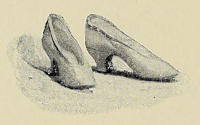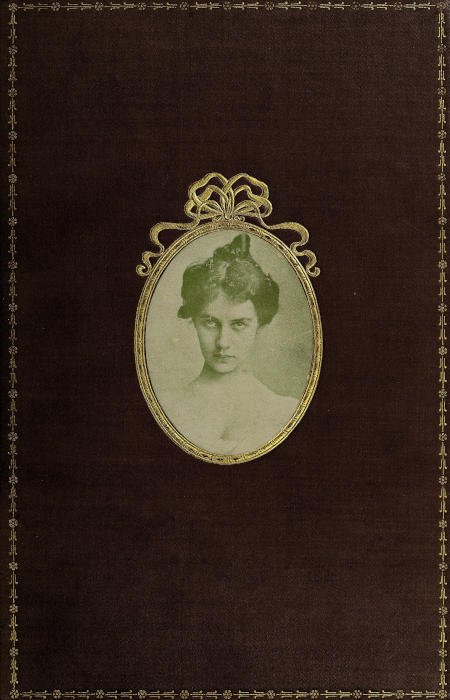
Title: Modern daughters
Conversations with various American girls and one man
Author: Alexander Black
Release date: July 11, 2023 [eBook #71170]
Language: English
Original publication: United States: Charles Scribner's Sons, 1899
Credits: Charlene Taylor and the Online Distributed Proofreading Team at https://www.pgdp.net (This file was produced from images generously made available by The Internet Archive)

Books by Alexander Black.

MODERN DAUGHTERS.
Conversations with Various American Girls and One Man. Fully illustrated from Photographs taken by the Author. 8vo. $2.50.
MISS AMERICA.
Pen and Camera Sketches of the American Girl. With 75 illustrations. 8vo. $2.50.
A CAPITAL COURTSHIP.
Illustrated from the Author’s Camera. 12mo. $1.00.
MISS JERRY.
A Love Story. Illustrated from the Author’s Camera. New Edition. 12mo. $1.00.
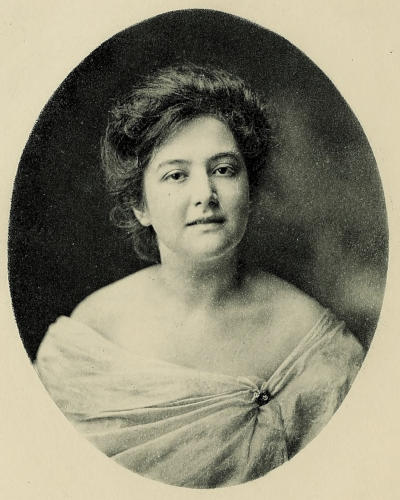

Modern Daughters
CONVERSATIONS WITH VARIOUS
AMERICAN GIRLS AND ONE MAN
BY
ALEXANDER BLACK
Author of “Miss America,” “Miss Jerry,” etc.
WITH DESIGNS AND
PHOTOGRAPHIC ILLUSTRATIONS
BY THE AUTHOR
CHARLES SCRIBNER’S SONS
NEW YORK · M DCCC XC IX
Copyright, 1899, by
Charles Scribner’s Sons
All rights reserved
University Press:
John Wilson and Son, Cambridge, U. S. A.
TO
GERALDINE AND CHRISTINE BROOKS
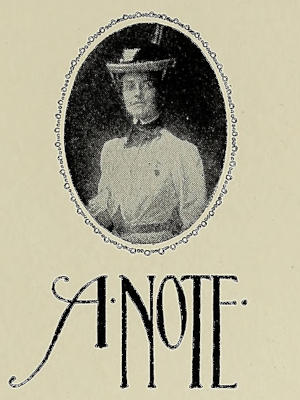

Which you, fair, friendly, discriminating reader (as the case may be), will please regard as properly folded, unsealed (having in mind the courteous delivery by the publisher), and running somewhat in this wise:
Begging your pardon for passing between you and the text proper, this is to say that if anything I have reported or confessed offends your sense of propriety, you are to read the offending passage a second time, whereupon you surely will discover evidences of an authorial humility incompatible with real irreverence. And if this apology sounds trite and lame, bear in mind that prefaces are written last, when a man (as when he has just parted from one of you) is completely quelled by a thought of the good things he might, or at least should, have said.
As for the pictorial obligato, if it shall occasionally show a curious indifference to the tune of the text, I trust that it may appear upon consideration that there are some very good reasons why this partnership should be as indefinite as it is.
And since you, reader, will in so many instances find yourself looking at your counterfeit presentment, I may, I hope, be allowed in this place to say this word of grateful acknowledgment to all of those daughters of the States who have permitted my camera to save my pen the impossible task of describing the beauty of the American girl.
A. B.
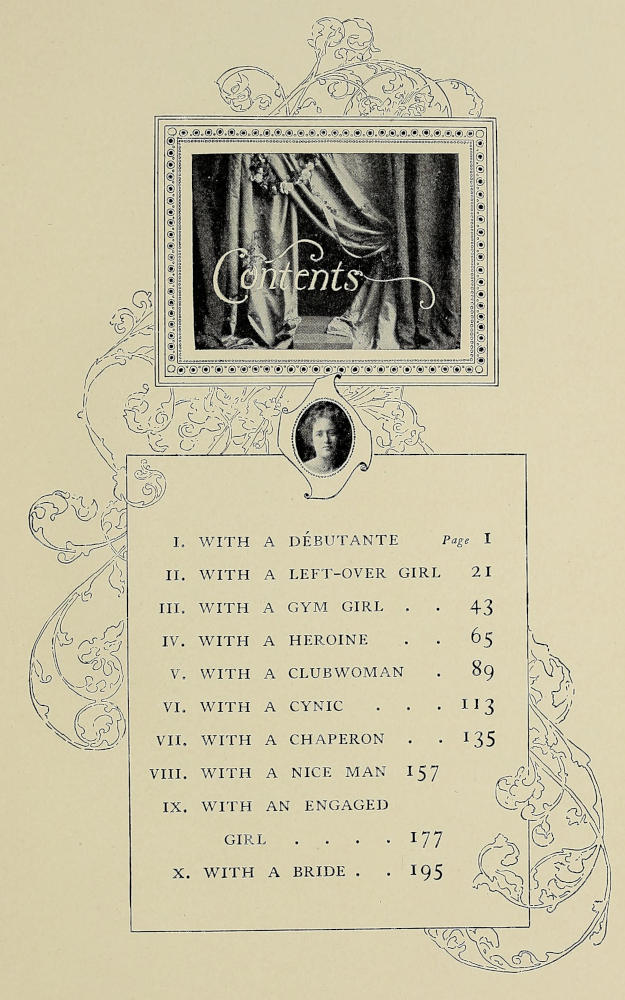
| I. | WITH A DÉBUTANTE | Page | 1 |
| II. | WITH A LEFT-OVER GIRL | 21 | |
| III. | WITH A GYM GIRL | 43 | |
| IV. | WITH A HEROINE | 65 | |
| V. | WITH A CLUBWOMAN | 89 | |
| VI. | WITH A CYNIC | 113 | |
| VII. | WITH A CHAPERON | 135 | |
| VIII. | WITH A NICE MAN | 157 | |
| IX. | WITH AN ENGAGED GIRL | 177 | |
| X. | WITH A BRIDE | 195 |
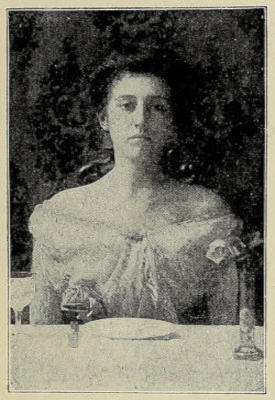
“And so,” I said, “you are to come out.”
She was not the girl I took in to dinner, a circumstance which invested her with a perverted interest. It often is so. The fact might remind us of the wider paradox—the fascination of the people in whom we shouldn’t be interested. I have noticed the same thing in the matter of duties, even of agreeable duties. When I have a book to write, I always can think of the most beautiful things for the book that I am to write next after that.
I tried to express something of this idea to her while the man who brought her in was talking to a charming lady on his left.
“As a means of justifying yourself,” she said, “I should find your philosophy needlessly circuitous. I hate justifications.”
“Now don’t,” I pleaded, “don’t upset my theory that every one—even a woman—prefers to be justified, is justified, in his (I wish we had taken up that new pronoun thon’s) own sight before doing anything.”
“How stupid! Can’t you see that your justification takes all the fun for me out of your conversation? Now, if you couldn’t justify yourself there would be something in it.”
“But I haven’t said that I do.”
“O I can feel it! You have a justified tone.”
“What an infliction!” I moaned. “A justified tone must be worse than a sanctified one. Isn’t it enough that I simply can’t help talking to you?”
“Certainly not. If you weren’t immersed in theories you would know that to a woman nothing could ever be enough.”
“It sometimes seems so,” I assented. “You might have reminded me of that.”
“Evidently you are meditating a cynicism. I can hear the rumble of it in the distance.”
“No,” I said, “cynicisms do not rumble. That is profundity. I was going to say, when you did riot interrupt me, that you typify for me the spirit of the insatiable in the modern young woman.”
“And we are at a dinner, too,” she returned severely. “Your profundities are very rude.”
“As for that, an appetite has ceased to be awkward. It is very pleasant to think that a girl and gastronomy are no longer incongruous.”
“So nice of you to let us eat.”
“My dear, the era not only permits you to eat, but insists on your eating, and dotes on the spectacle. The American girl is not a disembodied sentiment. She is a splendid physical fact. But that is another matter. The interesting thing for me at the moment is the news that you are coming out. Let us talk about that.”
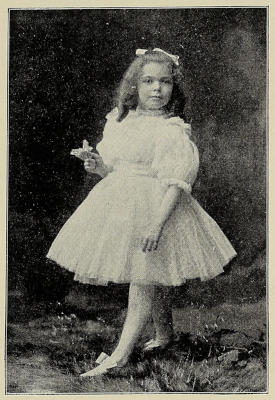
“An absurd topic. I can’t see anything interesting in that.”
“Which proves that you are insatiable. What could be more interesting?”
“O, it is interesting enough to me as a fact. It will be a comfort in some ways. But what is there to say of it? I am tired of not being out. Aunt Madeleine is tired of my not being out. So is papa.”
“Well,” I said, “I can see that it would be something to get off your mind.”
“O, it will be an immense relief, I can assure you. Not that I think there is anything in it. But it is something that one has to endure. I suspect that you regard it as something of a joke.”
“On the contrary, I regard it as an event of almost religious significance. If you would permit me to be sentimental I could say some rather pretty things about Coming Out as an institution. Débutanting is one of those incidents of civilized life which we all permit ourselves to contemplate with real enjoyment. I’m sure that your aunt will enjoy it.”
“But?—”
“I didn’t say ‘but’.”
“You looked it. There was a lurking ‘but’ in your tone, like the diminished seventh. But what?”
“I refuse to have a ‘but’ if I am to be challenged for it. A ‘but’ is sometimes a fragile thing.”
“Yes, and sometimes it is a buttress.”
“Not one that may not be shattered by a woman—even a very young woman.”
“You are intolerable.”
“And you are inquisitive—I mean acquisitive. And you know too much already.”
“Did that have anything to do with the ‘but?’”
“What?”
“That I know too much already?”
Perhaps I should have had to confess had not the lady whom I did take in to dinner demanded my attention at the moment. Presently the Débutante was saying: “Did you go to the Charity Ball?”
“Now you are having fun with me. Do I look like a charity baller?”
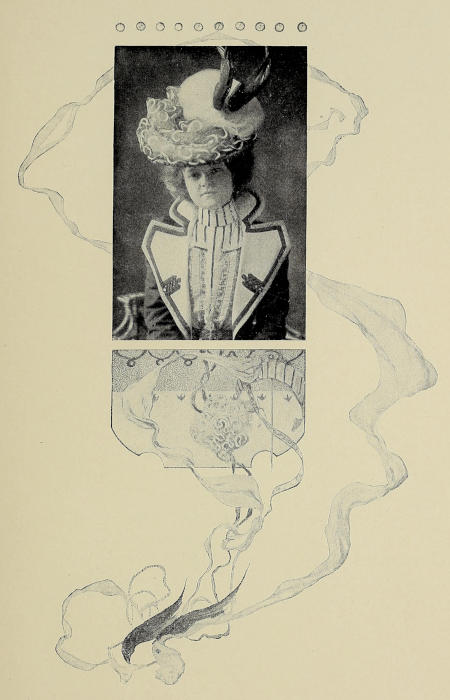
“Don’t sneer at the poor old Charity. It’s antique and has a grand march, but it’s a dear old affair.”
“I am not sneering. I never go to formidable dances. Now why did you ask me? Did you go?”
“No. I did last year. Aunt Madeleine has gone regularly for ten or fifteen years—and worn the same shade of velvet every time. This year I should have gone with her again, but Aunt Madeleine said it was too near my coming out.”
“I understand. That seems reasonable, too. Unless you were kept in a little I don’t see how you could come out.”
“I shouldn’t be here if I hadn’t promised Mrs. Amering in Paris that I would come. Aunt Madeleine was there and abetted me because she wanted to be nice to Mrs. Amering.”
“I fancy that your aunt is very good to you.”
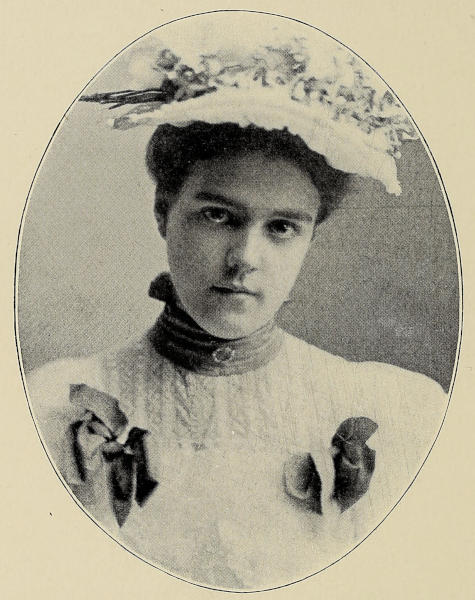
“O, Aunt Madeleine is a dear. But she is a trying paradox. You see, she wants to bring me up—and out—properly. But she likes to play at being radical, and sometimes I have to remind her that she is too reckless with me. She has spasms of conservative severity that really are very funny. Then her rigor relents and she takes it to heart if I don’t do something rampant. When she is in this mood she packs me off somewhere by myself. ‘You have too much of me,’ she says. That was how I came to go out on the Texas ranch last year. Uncle Billy Sandrix had expected both of us to come, and you should have seen him stare when I rode up to the ranch house on a crazy Indian pony,[8] a week before he was to come and meet us at Fort Worth. ‘What the devil,’ he said,—and that was all that he could say. I had a refulgent time there. The next evening, while Uncle Billy was telling me about one of his horses, a young fellow rode up and asked if he might stop there. Uncle Billy said ‘Certainly.’ That was just like Uncle Billy. The young man stabled his horse, and coming over to Uncle Billy, asked, ‘Where shall I sleep?’ Something in the way he said it must have riled[9] Uncle Billy, or a broad English accent may have struck his funny side. Anyway, he said, ‘Why, I don’t care. This pasture has only twenty thousand acres. It’s the smallest in the outfit, but you are welcome to sleeping room anywhere.’ This was just like Uncle Billy, too. The young man nodded and turned away; and we both thought he had been seriously offended. Presently Uncle Billy went out to look for him. But he was not to be seen. The next morning we found that the stranger had slept in the open, had harnessed at daylight and ridden away, leaving his thanks with one of the men. This hurt Uncle Billy and he tore after the stranger, ran him down in an hour, trotted him back, told him he had lots of sand, and wouldn’t let him go for two weeks. It turned out that the young man was the son of an English peer, who had run away from home. He didn’t tell me that until the end of the second week.”
“Yes; I daresay that at the end of the second week he was telling you everything.”
“Well, he was a lovely fellow, and really a very good rider for an Englishman. Even Uncle Billy liked his riding. I met him afterward in London, and he was very nice. It was delicious to hear him give me advice.”
“Advice?”
“Yes; he talked to me like a father and I laughed at him like a sister. It actually grieved him when I sometimes went out alone. You see, I couldn’t always make Aunt Madeleine go with[10] me. It worried him that I didn’t like his clothes. They simply didn’t fit and I said so. Then he patiently outlined his theory that it was bad art to have the clothes follow the figure. The American, he thought, dressed too timidly. The effect of the American’s clothes was too sweet. ‘A man should look superior to his clothes,’ he maintained. ‘And so,’ I said, ‘you have inferior clothes. How can a man better indicate his superiority to his clothes, how can he better dominate them, than by making them fit him?’ a remark which seemed to convince him that I was hopeless. At all events, he confessed that he’d never before had a girl find fault with his clothes.”
“I can fancy his being cut up about it. Do you do that sort of thing often?”
“If you mean find fault with a man’s clothes, no; if you mean tease a man for being too serious, yes.”
“I see; you are serious only when the man isn’t. Tell me: how do you find men in the average,—too serious?”
“At the wrong time—yes.”
“When you are older, my dear, you will find them less serious.”
“Which will prove what I say, that they are serious at the wrong time. Why should they be serious with me?”
“To be candid, it is all I can do to remain flippant enough.”
“That is brutal.”
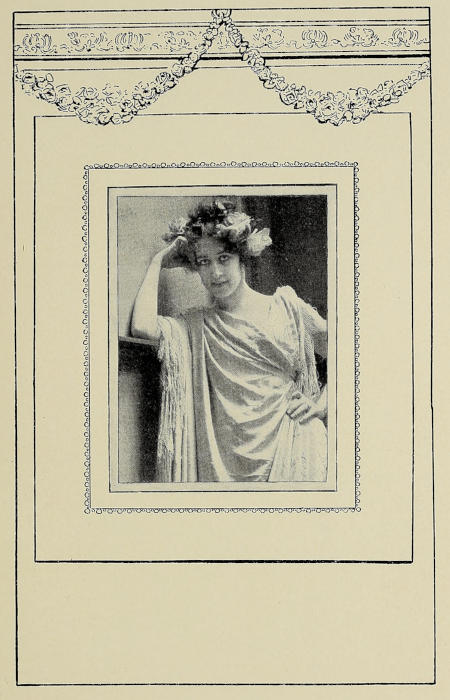
“You inspire me with the most serious thoughts.”
“That sounds like the charming curé I met in Provence. We had a delightful time at a country house, a romantic old vine-covered place where everybody you met was a character out of Balzac—when he is nice—or out of Daudet anywhere. Of course there had to be a curé, and he struck me like some book curé brought up to date. My, but he was handsome! with a romantic splash of gray at the temples. Why, a woman would tell her age to such a confessor! He knew a great deal about America. What he didn’t know he wanted me to tell him.”
“I hope you completed his knowledge.”
“He asked me if all American girls knew so much. I said that most of them knew much more; that I was an ignoramus who had been educated in three countries; who learned things to please her aunt and forgot them to please her father. It was funny to see how puzzled he was. First he was amiably gallant with me. Then he grew interrogatory, then sage. ‘My child,’ he said (it sounded just like a book), ‘you seem to have anticipated life.’ What do you suppose he was driving at? Then he went on, with a sort of grieved look, ‘You know too much.’ ‘And is this my reward,’ I demanded, ‘for being so good and answering all your questions?’ He laughed then, showing the loveliest teeth you ever saw. ‘I did not expect such answers,’ he said. When I told him afterward that we were going to Monte Carlo and then[14] to the Grand Prix (papa was with us), he looked at me as if he was wondering what I would do with them.”
“Did you go to Monte Carlo?”
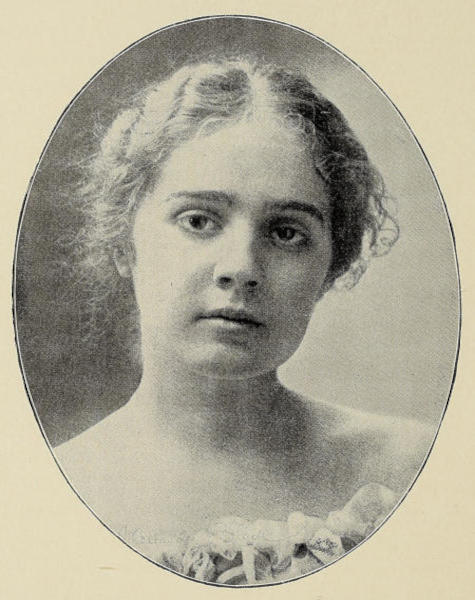
“Yes; but I didn’t think much of the game. I liked the little game at San Antonio better, though Aunt Madeleine made only a weak protest at Monaco, after raising a great row in Texas. And it was the same way about slumming. Aunt[15] Madeleine thought it was quite romantic in Naples, but was completely depressed at the vulgarity of going to Pell Street. Papa doesn’t care particularly to have me go unless he takes me himself; and he is more logical. He says that all slums smell alike to him. Do you know that very unexpectedly I had a good time at Mentone. Think of it! The very name sounds drowsy. Nobody ever cuts up at Mentone. I could only think of ‘Ordered South’ and so on. But there was a count there—a Count de—de—I forget now; it was an impossible name anyway; and he was so funny. He was more than serious. He was gloomy. He was more than gloomy. He was Gloom. You should have seen him! I shouldn’t have missed him for anything. He was prodigious—and so stunning looking.”
“You must have had a very good time.”
“I did. But you can’t imagine what luck I fell into; for there was a Pittsburg girl there, a Miss Gruge, who was—well, she had been ticketed for a title and a lot of money. Then her folks decided to let her go for a title without money, then for money related to a title. And they have kept on marking the poor thing down. You know how it will be. At some special sale she will go for away below cost. It is pitiful. And this Marked Down Girl and her mother simply bothered the Count to death. The more they pestered him the gloomier the Count got with me. I was afraid to cheer him up; it would have ended everything, and the fun[16] of riling Miss Gruge and her mother was too good. Well, one day when Aunt Madeleine had a headache he blurted out a proposal. ‘My dear Count,’ I said, ‘how absurd! Can’t you see that I am only a child? Why, I am not even in society. I’m not to be considered at all. For Heaven’s sake don’t let papa hear of this!’ As you might suppose, this made the Count even gloomier than ever. O, I hated to leave him!”
“I’m afraid you are a trifle cruel.”
“It isn’t cruelty; it’s a sense of humor.”
“You will be punished some day when you meet the man who has the right sense of humor. Perhaps he will have a dash of romantic gray, and fine teeth, and be maddeningly unserious—”
“O, I have met him already!”
“Indeed?”
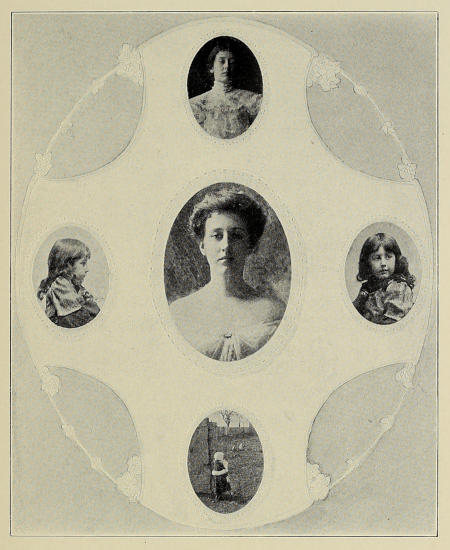
“At Washington. Papa had some legislative business there. The only way to get the thing through was to camp there, he said, and we camped there for a whole winter. I was afraid at first that it was going to be wretchedly dull. And it was, for a few weeks, until papa got his bearings, for meanwhile Aunt Madeleine had started to live up to her theory that if you got into the House set first your chances for the Senate and Cabinet sets were nothing at all. One afternoon at Mrs. Senator Pritter’s, I met an army man who is just the sort you have been threatening me with. Of course he only pretended to be unserious, but I gave him the credit of the pretence. One of the women had[19] whispered to me that the ring was going to defeat him for a promotion. When I asked him what the ring had against him, he was almost serious for a moment, and to tell you the truth, I almost liked him that way. ‘Who told you about the ring?’ he asked me. ‘My sources of information cannot be divulged,’ I said. ‘But why don’t you get it anyhow?’ He shook his head. ‘Let us talk about the weather.’ I wouldn’t let him off that way. ‘I like fighters,’ I persisted. ‘Why don’t you get everybody to work for you? Isn’t that the way it’s done?’ ‘Will you work for me?’ he asked. ‘You’re laughing at me,’ I said, ‘but I will work for you.’ Now you will laugh too, but I got eight senators to speak to the President about the Lieutenant, and he was promoted after all. When I saw him again, he was dreadfully serious, and made a great mess of thanking me. Afterward he wrote me a nice letter from Manila. All that got me quite interested in Washington.”
“Washington is quite an entertaining game—when you win.”
“I don’t ask to win always—if I like the game. It’s only in games I don’t like that I insist on winning.... What are you so quiet about?”
“I was thinking ... how nice it was that you were coming out.”
“I don’t believe you.”
“My dear, don’t flutter forth into this too-serious world in a distrustful mood.”
“I never have moods; I only have tenses.”
“And it is mostly the present tense. And yet you surely have begun to think about the future.”
“In another minute you will be giving me advice.”
“No; not exactly that, though I might ask yours.... Why, here’s the coffee!”
“When shall it be?... When shall you ask?”
“After you have come out.”
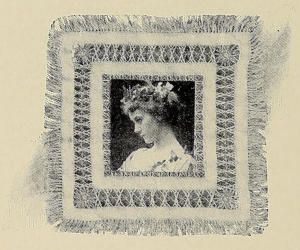
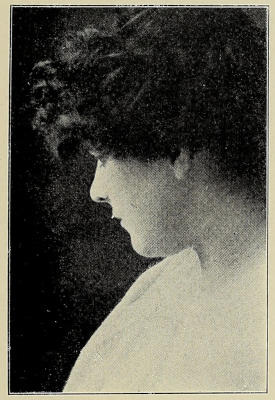
She had said that she did not care to play that afternoon, and the young man went away with a disappointed look. There had been one or two young men near her most of the time that day. Now she was alone. She sat in a shaded part of the hotel veranda. In her lap was an open book, face down. As I drew near I saw that the book was covered with a fragment of unlettered paper, a circumstance which left to merely ocular dexterity no chance of knowing what she was reading.
“My dear,” I said in a sort of paternal way, designed to palliate the effect of an intrusion, “for a moment I was tempted to think that you preferred a book to a man; but since you are not ardently reading I am giving myself so much of[22] the benefit of the doubt as to take this chair beside you, and to remark that you cannot expect to escape the common danger of being talked to even if you do not care to play.”
“You are very welcome. Talking is a game, too, isn’t it? We are supposed always to be ready to play that.”
“Nevertheless, perhaps I should ask you first, as the young man did just now about the other game, whether you really are willing. You might choose to go on with the book, and I could study the scenery.”
“This game has begun already. As for the book, I came to a stupid place,—a lot of description.”
“You know,” I said, “a man finds a certain justification for talking to a woman in the fact recently exploited by science, that woman does not talk to herself. While they still urge that it is not good for man to be alone, man seems to have invented one means of getting on alone that is denied to women; for if he can talk to himself he has acquired a singularly useful safety valve.”
“I am sure it is very nice of you, when you could talk to yourself, to waste words on me. I hope there isn’t anything in this new theory that may prove that man must talk. It would be upsetting, you know. Perhaps it isn’t true that women never talk to themselves. I don’t believe that I ever talk to myself, but I don’t have to. There is always somebody about. And I really never have anything left to say to myself.”
“I think I should prefer to have you take me for granted,” I said. “It would spoil your effect if you were either grateful or resentful. After all, these scientific generalizations are distressingly misleading. Take that recent statement that baldness is a safeguard against insanity. Some of the hair-restorer advertisements do not seem to indicate a faith in the entire sanity of the bald. Yet it is a benevolent theory. No one would voluntarily lose his hair for the certainty of not losing his reason, but the bald may derive some real solace from the invention. Doubtless many of life’s most comforting assurances have no better foundation.”
“Are you in that mood?”
“I am rebuked for my platitude.”
“In the talk game platitudes are very safe, don’t you think?”
“Perhaps they are; and in most games simply being safe naturally occupies much of the time. Yet in the talk game it can’t be fair to catch one’s breath with a platitude too often—not unless one wishes to be thrown back upon solitaire.”
“Solitaire is an excellent game. I think it is much underrated.”
“It is very safe, too.”
“Yes, and it is unquarrelsome. It never breaks friendships.”
“I can’t imagine you quarrelling in a game,” I ventured to say.
“Perhaps that is because I know with whom to play,—and which games to keep out of.”
“Do you know that it would be a great relief, if not a real comfort, to a man in certain circumstances if he could know just when a woman was out of the game? His perplexity in the matter of the greatest game of all, when he does not know whether she really is playing or only is loitering about with the players, sometimes is one of the most distressing spectacles in life.”
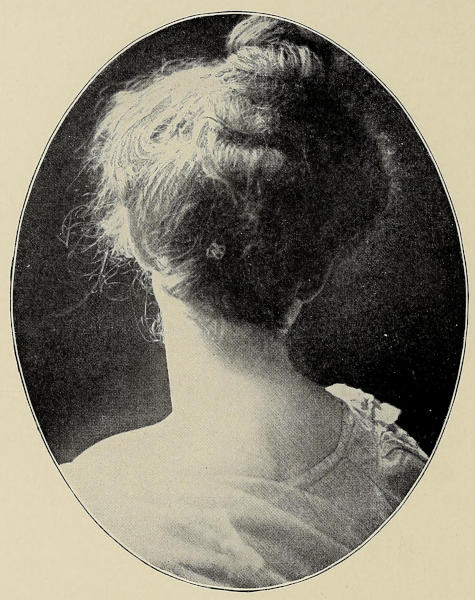
“It seems to me,” said the Left-Over Girl, with a little shrug, “that he generally should be able to[25] tell whether she is playing or not. As for knowing whether she ever is going to play any more, that seems to me like more knowledge than he is entitled to.”
“Possibly; but as I have suggested, it would save much time and many doubts, if nothing more,—reduce the sum of popular skepticism. And even the spectator, who is not presumed to be in the way of playing, might have a simple human curiosity in the matter.”
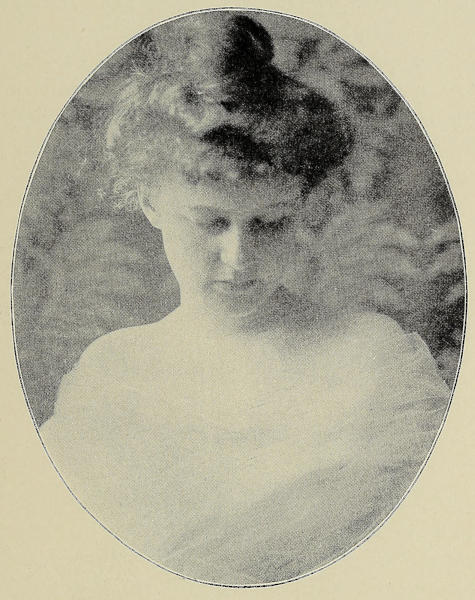
“Oh, the spectator always has curiosity, and the spectator is an element to be counted, too; there are so many of them, and they influence the players in one way or another so much. But I don’t think the spectators have any more right than the players to know when any one in particular is out of the game for good.”
“As for that, I much doubt whether any one is to be counted as out of the game for good. I heard yesterday of a Miss Nottingby who has just been married at the age of eighty-three. One never can tell. But that is not the point. It is the attitude of mind that counts. That a woman should think that she is out of the game, or have decided definitely that she will not play any more, must be of great importance even when the fact is not known, as we must suppose generally happens. My point is that if the facts were more generally known various beneficent results might accrue.”
“To whom?”
“To all of us, including the seceders. The uncertainty breeds cynicism. Of course I know that there is something piquing about the mystery surrounding the motives of the unmarried, especially the motives of the unmarried woman. But although this is so entertaining in itself, although the new old maid is the most cheerful, the most useful, and the most fascinating sphinx of the century, I feel at times as if there may be something disintegrating in her complacence and in the complacence of society regarding her.”
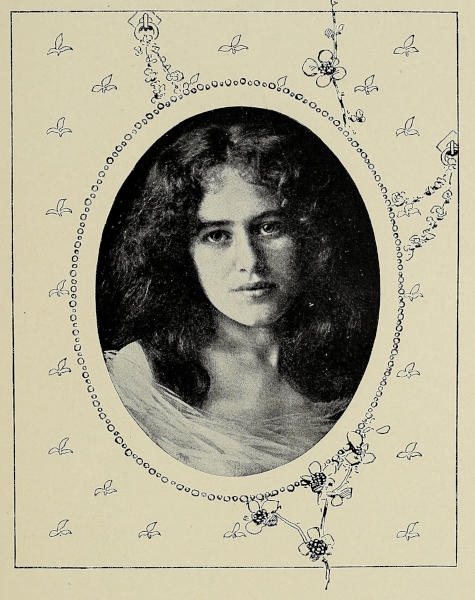
“How good it is of you to be so altruistically grieved!”
“Why don’t you ask me why I am saying this to you?”
“Because I know, and because it is so much more amusing to have you say it unassisted.”
“Now, do you know that I should have expected to find you superior to a proclivity so purely feminine as that. To make him say things unassisted! From the dawn of time woman has delighted to do that.”
There was a haze of thought in her eyes. “I dare say you never have stopped to think that when he is assisted he says so much more than he means.”
“I thought you were going to say, ‘than he ought to.’”
“The greater includes the less. When he says a little that he doesn’t mean he says a great deal more than he ought to.”
“Perhaps he always will say much that he shouldn’t, anyway. But admitting that you have the right to mystify him, and then not to help him, does it seem to you precisely fair that girls who neither go into the marrying game, nor stay out of it, should—”
“Flirt as much as they do—I want to save you the trouble of finding an inoffensive phrase.”
“Perhaps I wasn’t going to be inoffensive. And I might not have chosen the word ‘flirt.’ Flirt doesn’t exactly express the idea. I shouldn’t wish[30] to seem as if I were hunting about for a new title for an old crime,—”
“Crime? You will be quite solemn in a moment. Did you come over here to scold me?”
“I thought this was a talk game. A talk game couldn’t have a motive, could it?”
“Why, yes. It is like a Wagnerian composition. We might have encountered the Didactic Motive.”
“Now you are scolding me. I insist that I am merely the Interested Spectator. Maybe I am a sort of Walking Gentleman in the cast, who, with every wish not to be impertinent, ventures a timid and respectful word with the leading lady in the wings.”
“Should you think the Walking Gentleman had a right to quarrel with the leading lady as to her method of reading the lines?”
“No; but surely he might ask her, humbly, and in a spirit of honest inquiry, what she thought the author meant and whether, to her, the play seemed consistent. Even the Walking Gentleman must be presumed to have certain human impulses. Perhaps he can’t even find out who is the leading lady. Perhaps the girl who seems designed by nature to be the heroine, the girl who, if he were the Hero and not the Walking Gentleman, would make his duty clear, betrays a singular indifference to the Hero, the Hero’s understudy, and all the rest of them.”
“Then you have come over here with a view to classifying me?”
“Suppose I had so definite a hope?”
“I might help you.”
“What are you, please?”
“I am the Left-Over Girl.”
“I don’t wish to be ungracious, but that does not help me much. Who or what has left you over?”
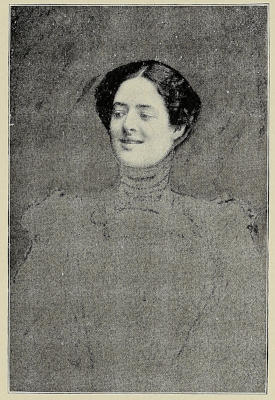
“Circumstances. In the course of the great readjustment I am left out, lost in the shuffle, if you like.” This idea seemed to please her. “Marriage is like any other game, isn’t it? He calls her bluff—”
“Don’t!” I protested. “These card game allusions perplex me as much as the paradox which I have encountered in my travels this year, that poker is popular in New England and dominoes in Texas.”
“But somebody told me that they play a very wicked kind of dominoes in Texas, and I know that they play a very moral kind of poker in New England.”
“I am afraid you play poker.”
“Like Mistress Muslin, I love cards. And you[32] know there are some people who never have good hands. Doesn’t that prove that the word ‘chance’ has a deep and dark meaning? There is fate behind chance. I never had a good hand but once.”
“In which game?”
“Oh, in the card game. And I didn’t win, for the old reason—my partner was so stupid. I could have withered him. But he was an unwitherable man.”
“I wish that you would tell me something more about this left-over situation. Not that I think you can know very much about it yet. You cannot have been left over very long, and asking you about your left-overness may be almost as premature as intercepting the newly arrived European traveller in New York Bay and asking him how he likes America.”
“I suppose you wish to ask me how it feels to be left over.”
“No, I haven’t got so far as that. As you have taken part, as it were, in the circumstances which have left you over, I should like to find out if I could, that is to say, if you felt that you could tell me, which qualities in you tended to bring about this result. I feel quite certain that you are not a born old maid. The born old maid is one of nature’s whimsicalities that are not hard to read. Even when she is married, one may easily recognize her. What interests me is the subtle differentiation in those among the unmarried who never[33] will be old maids, which has produced their left-overness. For the life of me I can’t see why you should be left over, either subjectively or objectively. Is it a gnawing prejudice, or a sense of humor, that has made you leave yourself over?”
“Might not those things characterize an old maid?”
“They might, but an old maid would be an old maid without regard to the possession of any such particular qualities. The old maid instinct is another matter. We are talking now about this different and evolved modern tendency.”
“Suppose I were to say that marriage simply is not in my line. What should you say that that indicated? Might not an old maid say that?”
“She might say it and she does say it, which may indicate how indefinite it is. In the interest of social science I really should like to know what you think you mean by that. Of course questions upon so serious a matter necessarily seem a trifle brutal.”
“Don’t apologize, Mr. Scientist. I suspect that the trouble with me is that I can’t get up a personal interest in marriage. I have no prejudice against it as an institution, or as a—state of mind. I am not even single because I am cautious. No one has preached to me the philosophy of disenchantment. I know married people who are happy, and single people who are unhappy. I have seen the tall girl and the short man, and the tall man and the short girl, illustrate the splendid paradoxes[34] of pairing. I believe that marriage is just as good and just as bad as the people who illustrate it. But I haven’t been able to get up any personal interest in it, any more than I have been able to get up a personal interest in the law or medicine. After all, marriage is a career. I don’t hate the Church because I do not feel called to preach. Yet I don’t feel that I have the least instinctive aversion to marriage. Do you suppose that if I were a born old maid I should be conscious of the instinctive removal?”
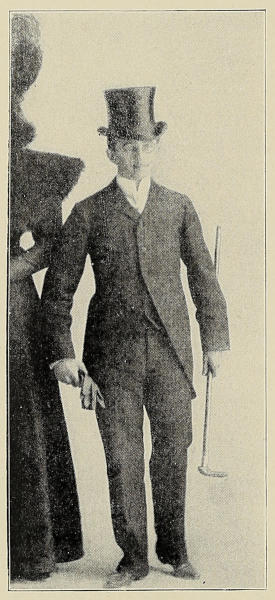
“Probably not. Do you hear that music in the hotel parlor that has supplied a plaintive accompaniment to our talk?”
“That is Miss—hush! If ever there was an old maid born—”
“Yes, and that woman has dreamed of marriage from her girlhood. Wasn’t it Charles Lamb who said with regard to music that he was sentimentally disposed to harmony but applicably was incapable of a tune? Poetry and the old maid instinct have battled in that woman for forty years. But we are slipping[35] from science into gossip. Shouldn’t she answer your question?”
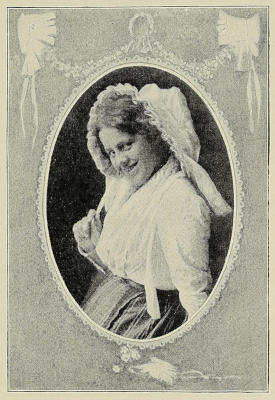
“I don’t know. Who can say that she isn’t conscious of the instinct? Lamb knew that he couldn’t actually make a tune. It was Lamb, wasn’t it, who tried all his life to like Scotsmen? And when he gave up at the end he was so sweet about it. He couldn’t like them, but he didn’t have a bit of additional resentment because he had failed. Some people hate—with interest from the date of prejudice. Now I have been trying for—quite a few years to like marriage,—personally, you know,—and if I fail I don’t expect to place any interest charges against the institution.”
“And on the other hand, if you succeed, you mustn’t expect marriage to pay you too heavily on the investment.”
“I’m afraid I should be more likely to do that than the other. I suppose that shows that I am not a philosopher. If I ever marry—but how[36] ridiculous that sounds! You would think I was talking about—any other career.”
“Oh, if I were selling stock in matrimony, I should consider you quite a hopeful case. But I’ll wager that many another man has thought the same thing. And naturally you have not been seriously conscious of the phases of yourself that have made you seem like a hopeful case to them. I was reading the other day in a new Franklin biography an advertisement written by Franklin and appearing in his paper. It concerned certain missing books of his, and was headed: ‘Lent and Forgot to Whom,’ Ah! my dear, it is so with many of you women: you lend and forget to whom. But the men—”
“What a dreadfully unfortunate analogy! If they keep that which does not belong to them, am I to blame? And how can a girl try to like matrimony without trying to like men? I ought not to be feminine enough to remind you that men have been known to ‘forget to whom.’ Do you see that young fellow coming up the path with the girl in white duck? You see what an adroit, hovering style he has? I know just the sort of thing he is saying to that white duckling. He is one of the men who forget to whom. He is a Cynic-Maker.”
We watched them silently as they sauntered up the path.
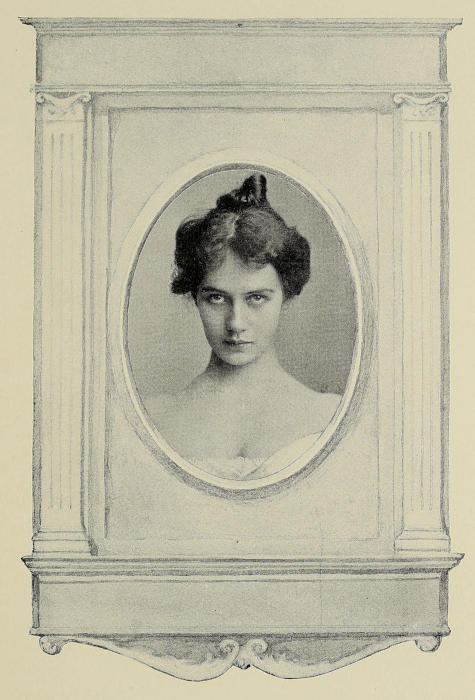
“Yes,” I said, “that is the way the great tangle begins. A nice girl meets your Cynic-Maker, finds that he forgets to whom, from which she concludes[39] that all men are a mockery. Then some honest young fellow meets her, revolts at her crude, newly fledged cynicism, which an older or a less honest man might have penetrated in a moment, decides that all women are depraved, and there you are with all the elements of a social tragedy. We may say that the arch-mischief-maker is the man who creates the cynic; yet we should, perhaps, inquire whether any new conditions are producing him.”
“He is as old as lying,” she said quietly, her eyes following him up the steps.
“The one comfort,” I added, “is that he probably does not succeed in making cynics so easily as in an earlier state of society.”
“You mean that girls are more skeptical?”
“I mean that girls have more freedom, more experience, more information, more opportunities for comparison, and that the Cynic-Maker, to succeed, has to be vastly cleverer than he used to be.”
“I believe I shall join you in that optimism, though I am inclined to think that by an operation of natural selection he is vastly cleverer than he used to be.”
The Cynic-Maker sat down beside the white duckling at the other end of the veranda.
“Witness,” I said, “the grotesque appositions of life: The Cynic-Maker and the Victim at one end of the stage, and the Spectator with the Left-Over Girl at the Other. Surely we have[40] here some very important elements of a social allegory.”
“And in spite of everything,” mused the Left-Over Girl, “I was going to say just now that I thought marriage was more popular than ever.”
“What makes you think that—I mean in view of the statistics, in view of the census of the unmarried?”
“You must not insist upon participation only as indicating popularity. Take the instance of golf, which few people actually play, but which is the game all the same. I mean that in proportion to the number who do not marry there is less affirmative objection to marriage than in the past.”
“I wish I knew how you make that out. But I am going to take this much from it, and you will correct me if I am wrong: Women are less likely to marry than formerly; but they are also less certain not to marry.”
“Would it cheer you any to believe that?”
“I do not insist upon being cheered. But I should like to know. I am weak enough to want to be confirmed in a belief which I have tried to formulate. You can see that matrimony might get some comfort out of it just as golf does. It might enjoy the flattery of being the greatest game even if every one doesn’t choose to play, even if certain charming women do choose to cover their emotions with a veil of sophistry as they cover their books with brown paper.”
“And thou, Brutus!—after I had lifted the veil![41] I am very magnanimous. I play a talk game with you, and let you ask me impossible questions, label myself for you, uncover my dearest theories, deal mercifully with your syllogizing, and now I agree to your formula,—yes, and I take off my brown paper. What more could mortal woman do?”
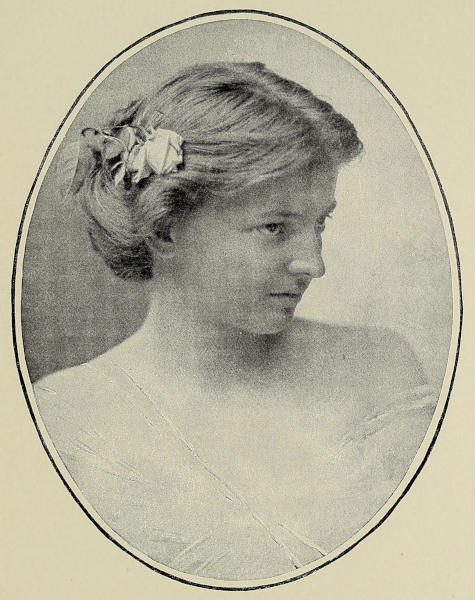
“Nothing more,” I said, staring at the lettering[42] on the book, “nothing more, except tell me why on earth you are reading ‘Emma’?”
She gave a little chuckle and shook her head. “That,” she said, “is the one thing you have asked that I can not answer.”
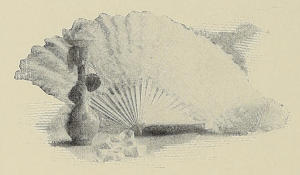
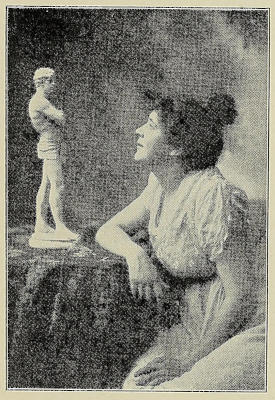
There had been some mistake about the time, and she was there an hour ahead of the class, a circumstance which I had not the conscience to resent, for she said I might stay until the class came. Meanwhile we sat in the big, cool gymnasium, into which fell patches of spring sunlight that painted here the shining floor, and there striped the dangling lines of rope, falling finally into whimsical arabesques on the dumb-bell rack. It was a co-educational sort of gymnasium, as one might guess from the punching-bag and other devices, classes of men and[44] women, boys and girls, alternating in possession, under the discipline of an academy.
She herself wore a dark serge gym suit, that fascinating hybrid of skirt and bloomer, which unites the charm of drapery with the effect of the girded uniform. Sitting there thus well-dressed, lithe, poised, sufficient, with light in her eyes and blood in her lips, she presented a pleasing spectacle. Something in her association with all the paraphernalia of the vaulted gymnasium struck me as symbolizing the situation of her sex in the modern world. She seemed only prophetically adjusted to it all, and yet one could not but have the feeling that she would always know just what to leave alone.
For some reason that did not appear at the moment, she was not merely the feminine version of the athlete. She was something differing from that, doubtless something better. I could not think of her as promoting athletics. The athletics seemed to be promoting her. The ultimate thing was not a system, a day, an hour, an event. The ultimate thing was herself. The theory of athletics from a man’s viewpoint is a pretty affair, and unquestionably it includes the notion of a finer physical manhood for us all, directly in the participants, by reflection in the rest of us. Even football, the reductio ad absurdum of inter-personal conflict, is presumed and I believe reasonably, to have a tonic influence on the physical development of the race, although there is no country in the world where, in[45] the habit of daily life, it is more unsafe than in this for one man to shoulder another. But in feminine athletics so far as these have gone, there yet appears much less of the idea of prospective conflict. It may be that this is to come again later. A bunch of girls in a hand-ball game introduces a lively element of organized contest. But it scarcely looks as if the girl runner of the Greek games was likely to be repeated.
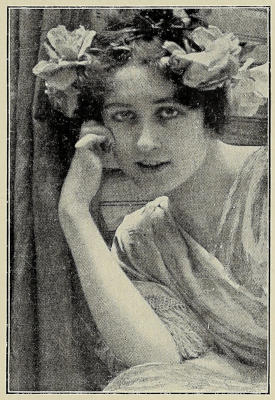
“I suppose you think all this is very absurd,” said the Gym Girl, tapping the floor with her slipper. “Sometimes I myself think it is. But I like it; I like it well enough not to care what any one thinks, and besides, I am supported by the moments when I think it isn’t a bit absurd.”
“Which moment is this?”
“I should find it hard to say. Until I know what you think about it, I feel defensive about the gym. Generally speaking, I feel rather cordial toward it to-day.”
“Then please feel cordial toward me, too, for I like the gym and the idea the gym represents.”
“What idea does the gym represent?” she asked in a tone of challenge.
“Now that is scarcely hospitable. Moreover, I had saved up that to ask you. But I don’t mind committing myself, with the understanding that you are to supplement me in the matter. This gymnasium seems to me to stand for the idea of physical equilibrium. It means that you and the others are not willing to give up what the city seeks to force you to give up for the time. In the country I hope you lead such a life that the gymnasium would be absurd there. But in the city it is very different for all of us, but especially for you women. The clothes you usually wear here presuppose that you will suspend, while wearing them, the use or development of most of your muscles. Some of the time you will wear a bicycle skirt and ride a wheel. But the bicycle uses but one set of muscles. Your walking and dancing, with some tennis and an occasional run out to the links for golf, all leave the symmetrical development incomplete in some way. They do not include the immensely important element of climbing, for example. The gymnasium ought to fill in the chinks. I suppose it does. Then it makes you like it. Perhaps that is one of the best things it does.”
“It does make me like it, because it makes me like myself. The gymnasium makes me feel good,—good, do you understand, not merely well.”
“We often have been told that if we all were well we all should be good.”
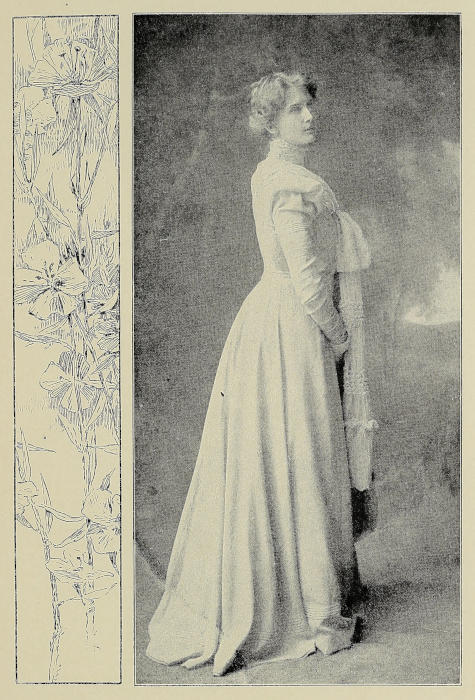
“I don’t suppose I am good enough to hurt, but it is nice to feel that way. Mind you, I don’t[49] agree at all that women need the gymnasium any more than men do. I have three brothers, and I know some things. I know that the average man is just as much hampered by his clothes as the average woman. I really think he is hampered more, for he defers to his clothes more than a woman defers to hers. A woman’s management of her skirt at least gives her a certain amount of exercise, while a man’s horror of bagging his trousers at the knees has not a single physical compensation. It simply limits his movements.”
“But a woman’s skirt limits her movements.”
“I wouldn’t say that it limited them so much as it directed them.”
“Perhaps you will tell me why most women are or seem to be pigeon toed.”
“I can explain that. It is for the same reason that they waddle when they go up stairs. The reason is the skirt. I can illustrate by a diagram,” and she found a hoople and placed it on the floor. “That we shall say is Figure One. Now, I place here two dumb-bells. These we shall say are feet standing within the radius of the skirt. Now the point of freest action in stepping for the feet B and C obviously lies in the direction of A. Toward A the foot B can move in the longest line without striking the skirt. Hence in walking the tendency for one foot to follow the other in the direction of A and the centrifugal tendency of the toes. As women learn to wear shorter skirts or wear short skirts a greater proportion of the time the likelihood[50] that they will be intoed will naturally decrease.”
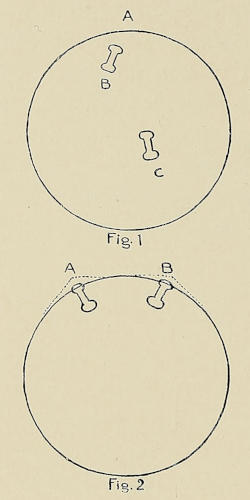
“Very convincing!” I cried. “The intoed tendency is beautifully extenuated in a most logical way. Plainly it would be as foolish for a woman to walk with her toes out as it would be for a cavalryman to ride with his knees out.”
“Unless she were going up stairs.”
“Up stairs? Oh, I see. You are to explain the waddling. That will be an immense comfort to every man—I mean the explanation. So many of us have turned our faces away from the spectacle of a lovely creature who walked with a Delsartean lilt and seated herself with the inexpressible grace of a bird who has reached the chosen branch, mounting a flight of steps with the roll of a breathless duck.”
“Let us now take this hoople for Figure Two,” said the Gym Girl, with a serious effect. “The two feet, still represented by the dumb-bells, now seek not the point of least resistance but the point of most resistance. They do not wish to tread on the gown, which is likely to happen, even when it is slightly lifted, unless the knees assist in lifting the forward edge. This chalk mark extending[51] to A and B will indicate by its variation from the circular line the direction in which the feet alternately move in the effort to keep the skirt free in front. Of course a woman who tries to go up stairs with her hands full, without holding her skirt, must waddle more than a woman who is able to let her hands help her feet.”
“I have no doubt that what you have intimated with regard to the dexterities imposed by the skirt is quite true. There must be a certain important amount of muscular power not otherwise demanded in the current method of holding up the skirt with one hand at the back, or even in twisting the loose of it into a tuft on one hip. The habit doesn’t seem to be intrinsically pretty, yet it has that fascination which makes us wonder whether conventional ideas of beauty are of any importance whatever. I fancy that Greek and Roman women had some such untransmittable method of managing redundant drapery during those intervals when the use[52] of beauty gave place to its twin, the beauty of use.”
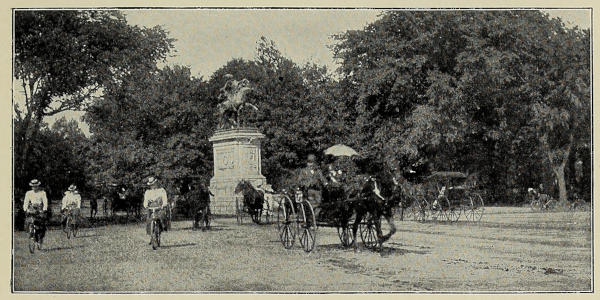
“Yes, I think you will find that from the beginning of time woman has sought to combine garments in which she may be becomingly draped and in which she may move abroad. The Professor tells us that a trailing gown is an anachronism out of doors, save to those women who are carried—you know what I mean, in a carriage or something. We have heard that a great many times; but all the same, I suppose women will go on trying to make the gown they prefer to be seen in do service during the transits as well as during the pauses.”
“There is much transit about the modern woman.”
“I hope you find something to be glad of in that.”
“I do; but no man can help feeling that draperies are a great burden which no gallantry can lighten.”
“O yes, gallantry can! See that her packages are sent home—or carry them for her.”
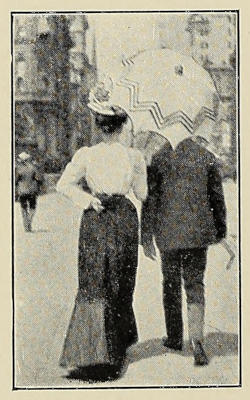
“Understand me: I think that draperies held up in the right way by the right woman are an element of real picturesqueness in modern life. But sometimes they are not held up at all.”
“Yes, I know. Theoretically[53] a lady does not let her dress drag in an unclean place. But actually there is a good deal of dragging. It is a pity, too, if you men are going to be disturbed by it. There should be consolation for you in the frequent gym suit—which you seldom see, because you are not often permitted to enjoy your present privileges—and in the more frequent bicycle suit. The bicycle has done in one decade what abstract dress reforming would never have accomplished. Sometimes I think that the most important inventions of the century are the bicycle and the shirt waist. Each has had an immensely important influence on the physical and economic situation of women. I have no doubt the bicycle will get full credit, but if no historian mentions the shirt waist the shirt waist will proclaim its own triumph.”
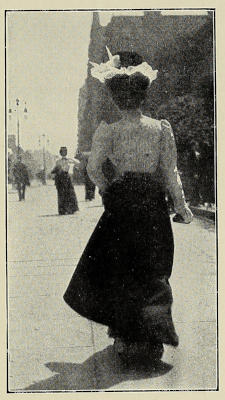
“I believe you have been writing a paper on that.”
“No, I am not a paper-writing girl. One thing I am sure of: The review of women’s dress during the century will surely dismiss the shirt-waist with a few lines.”
“I dare say. It will go unsung, like the plain, average, every-day woman, who is doing so much of the world’s work,—I mean, of course, except on the Woman’s Page. Do you know you explained some things to me so beautifully a moment ago that I am tempted to put your sophistry—I mean your scientific analysis—to the crucial test. Let me do this in a word:—We have spoken of clothes, and we have spoken of transit. Why do women get off a public vehicle backward? I say public vehicle advisedly, for I have seen a woman get on and off a horse properly—assisted. I have seen her get off a bicycle properly, unassisted. I have even seen her get out of a coach properly. But few men have ever seen a woman leave a trolley-car or a railway-coach otherwise than backwards.”
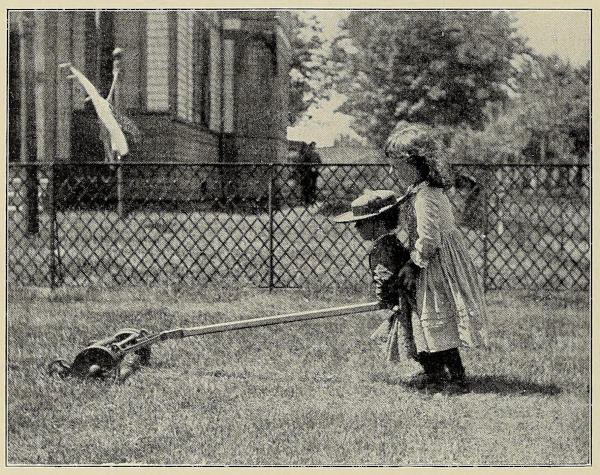
“When you say ‘backwards,’ I know that you don’t mean backwards in the sense in which an old lady or a very portly person of any age gets out backwards,—turning about, holding with both hands, and backing off. That was the way Ian Maclaren’s old lady tried to get off the underground train, wasn’t it? and was pulled up the steps at one station after another by men who thought that she was getting on? You mean getting off with the face to the rear, instead of with the face to the engine, the motor, or the horse.”

“That is what I do mean.”
“I had supposed that there was but one answer to that old question: Because they have not been trained by getting on and off vehicles while the vehicles are in motion. A person who gets on a[56] vehicle while it is in motion learns at once that the forward handle is the only safe handle to hold either in getting on or getting off. The forward handle is the one that preserves your balance should the vehicle start while you are getting on or off.”
“Yes,” I said, “that is the old answer, too. But it does not answer enough. I have disproved its accuracy a score of times. I have seen women who knew better by precept, by example, and by experience get off backward, as if obeying some fatalistic impulse. The other day a woman who stepped off a car in my presence, firmly grasping the wrong handle, laughed and said, ‘There! that’s the wrong handle, but I can’t help it!’ That illustrates what I mean. She could not tell why she had to take the wrong handle, which, if the car had been going in the other direction would have demanded the other hand. Your theory at best would only explain why women do not get off rightly. It does not explain why nine hundred and ninety-nine out of a thousand get off wrongly. It would be well enough if the proportions were even, if the habit seemed like a matter of chance. But quite plainly it is not a matter of chance. There is a strange, and, as yet, unexplained impulse to which women yield when the moment of choice comes. Every day I see women get off the wrong way at real inconvenience. They are like Jerome K. Jerome’s stage villain who doesn’t want to be a villain, who is not profited by being a villain, but who, quite uncomplainingly,[57] goes on being the villain in obedience to the unities. Once I thought I had grasped the thing, which you must know gave me a moment of superior comfort. A coach or a car, I said to myself, generally stops at a point beyond that at which the passenger really wishes to alight, as at the further curb, and in getting off and spurning the vehicle, as it were, the woman passenger, acting with primitive directness, turns her back upon it at the moment of alighting. But I have repeatedly seen women get off a trolley-car at a near corner when they had to turn about and walk in the direction the car was going, and they faced the rear of the car when they got off just as they do under all other circumstances. It is extraordinary. You must not think the inquiry trivial. It is not merely a question of a minor physical habit. There certainly is some momentous psychological significance under it all, something with a deep meaning if we only could get at it.”
“Perhaps this backwardness has something to do with woman’s confusion as to right and left.”
“Heavens!” I exclaimed. “I thought for an instant you were going to say right and wrong! The right and left confusion explains nothing, for in those directions in which people are confused as between right and left they are as likely to take one as the other. How could that explain why a woman uses her right hand when she should use her left, and her left when she should use her right?”
“I’m afraid it wouldn’t, unless you wished to fortify some theory of her natural perverseness, and I hope you don’t wish to be so trite. You shouldn’t hurry woman too much. See what physical agility she is displaying with the bicycle. She is unfolding wonderfully. You men are too impatient. I read an advertisement the other day in which I saw a tangible sign of this impatience. It was headed. ‘A Moustache in a Month.’ Surely that is wrong.”
“Yes, it is as wrong as the conditions indicated by a department store advertisement I read the other day which began: ‘Great Embroidery Excitement.’”
“O, I know we are all too intense. I understand that it is telling in our appearance. A scientific observer has been reminding us that we Americans have too much expression, and that the dull, stupid look in certain English faces, for instance, indicates reserve force, a force that is not constantly being wasted in expression. They say we even go to sleep with our expressions. My teacher says, ‘When you go to bed, unlock your face.’”
“Are teachers really bothering you about your expressions? Your teacher must be a woman.”
“She is, and—”
“I thought so. Only a woman—”
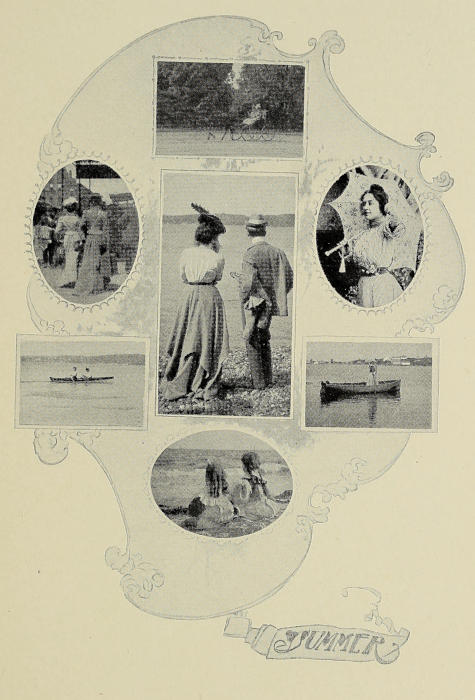
“Yes, I know. Our expressions are too lovely to be ruthlessly modified. I credit you with all that you could say. But you are not a bit practical. Our nerves are more important than our expressions.[61] I guess you may count on us for expression enough when the occasion demands. What we want are healthy nerves behind the expressions.”
“I see; you are going in for that stupid look now.”
“If it becomes necessary.”
“You never will succeed.”
“Probably I don’t want you to hope we will. You know what I mean—”
“How can I help knowing? Do we hear anything else but relaxing? Those of you who are not relaxing tremendously are repenting of your outlines and straining to get thin.”
“Don’t you suppose there are great advantages in these readjustments? When a girl is very pretty she is pampered; when she is pampered she grows fat; when she grows fat she grows ugly; and so things are balanced.”
“Let me amend that,” I said. “When she gets fat she gets frightened, diets, and gets fatter. Then she gets a little angry, golfs, rides, swims, hustles, finds the secret, gets reasonably proper again and acquires the new charm that comes with the aroused energy and the humility of a threatened loss—or gain, as you may wish to put it. Nothing is more qualifying than the threatened adversity of fat. We all know women who would be simply insufferable if they were not a shade plumper than they care to be. I fancy that leanness induces a more private humility.”
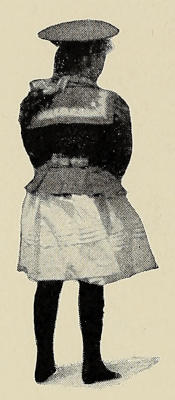
“It is a more private defect. But this is all to be righted in the next century. Our new ideals are going to give us more of the English physique. Anyway, we are going to be more athletic, not merely in this gymnasium way, which is only a sign of good faith, but in a broader, more practical, more—shall I say final?—way. See what summer means to us now.”
“Well, it seems to mean a great many things.”
“It means everything that could make a gym unnecessary. It once meant very little, it seems to me; if we are to believe what our grandmothers tell us. Now it means as much to a girl as to her brother.”
“It doesn’t mean quite as much as it might if there were more brothers—there.”
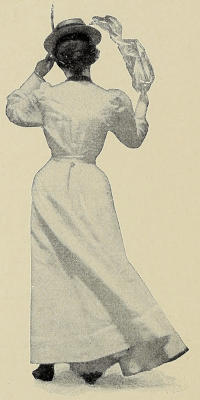
“True. Our summer groups always make me think of college. We are not through seeing too much of one another when we graduate. Presently we are in clubs or gym classes, and, in the summer, man is an exceptional element.”
“And that is not good for[63] him. It is not good for him to be in such a majority in the city nor in such a minority in the country. But I don’t see what we can do about it.”
“I suppose each sex will have to go on living out the problem for itself. That seems likely to keep both sexes busy.”
“It is keeping your sex busy.”
“You never can tell about us.”
“I admit that.”
“We have great larks over the profound things, and go to pieces—”
“Relaxing.”
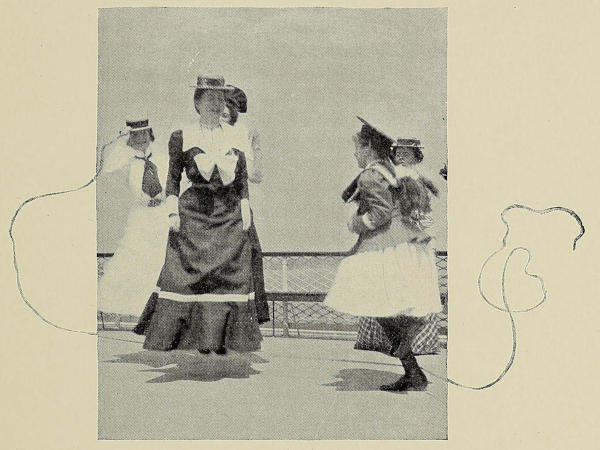
She laughed, and got up in her easy, definite[64] way. “You must go now,—not because you have been naughty, but because the class is coming.”
“That is a class decision. But I bow to your ruling, Miss Gym.”

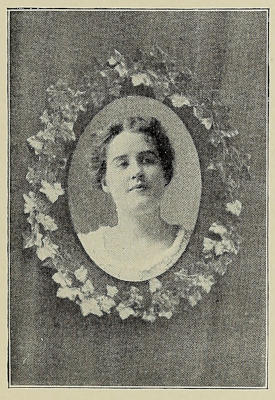
When I asked her what sort of heroine she was, she looked up with a laugh and said that she didn’t see how it was possible to say precisely until the end of the story.
“And yet,” I said, “one generally can make a good guess before the last chapter comes.”
“Then you may do that,” she rejoined.
“I dare say I might find out by the process of elimination. You are not a heroine because you are travelling alone from Los Angeles to Richmond?”
“No. In this age and country there isn’t a particle of heroism in that. Why, you remember[66] that ‘a woman might travel from one end of Britain to the other with safety in Eadwine’s day.’”
“It is not because you are travelling in a bicycle suit?”
“No. There are no more heroics in clothes.”
“Perhaps you have been ordered home against your wishes, and are illustrating that pleasant miracle ‘fair looks and true obedience’?”
“No. I rather enjoy being obedient; and I am going of my own accord.”
“Then I have no doubt that your going out there had something heroic about it; or maybe—”
“Those are all wide of the mark. I hardly think you are likely to guess correctly.”
“Well,” I said, “there is one comfort: I can see precisely what sort of heroine you are—in appearance. That is a great start. Nowadays, we have to do a heap of guessing as to the embodied element in the heroines we read about. We all have prejudices, and it is nice to get rid of them at the beginning. I knew of a New England lady who was immensely disappointed in her new pastor because, as she said, she ‘never could abide a minister who was light complected.’”
“I am sorry to rob you of the privilege of fashioning the physical heroine after your own fancy. I always like to have at least a little of my own way in the matter of the hero. When he is described too circumstantially there is nothing left for me. You see I might object to the hero who was light complected.”
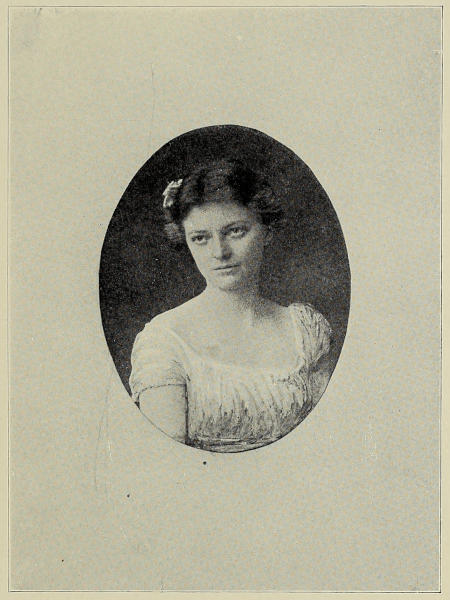
“O, I can see,” I said, “that you probably dote on these disembodied novels that deal entirely with emotions, that have been trying for a decade or two to get as far as possible from the Dickens Gentleman-with-the-White-Waistcoat point of view. For a long time it seems to have been considered vulgar in a literary sense to descend to the description of clothes—as if clothes were not of great importance[68] in helping us to get at the character of a man—or a woman.”
“But we don’t need that help in a book, do we, when we have the author to tell us what is inside?”
“Yes, that is what those fellows will tell you. But is that really so? When we know what the character looks like—that is, what the author thinks the character looks like—do we not gain a definite and necessary impression beyond that which the author sets out to give?”
“Perhaps the author doesn’t want you to go wandering off that way. When he is so ready to tell you what is inside, what is the use of giving you material for any other impression?”
“Because the reader will have an impression of his own anyway, and the author owes him all the facts. Now, let us suppose that some one was to go on with a story about you, a mysterious young woman in a Pullman coach; can’t you see that it would be vastly more interesting to me because I could picture you easily as the story went on? Don’t you suppose that I should be more likely to be interested in your emotions because I had seen you than I should in seeing you because I had heard about your emotions?”
“Oh, I don’t know. I suppose it would depend. But if you are going back to old-fashioned romance what is the use of describing the heroine? She is always the same. Wait a moment.”
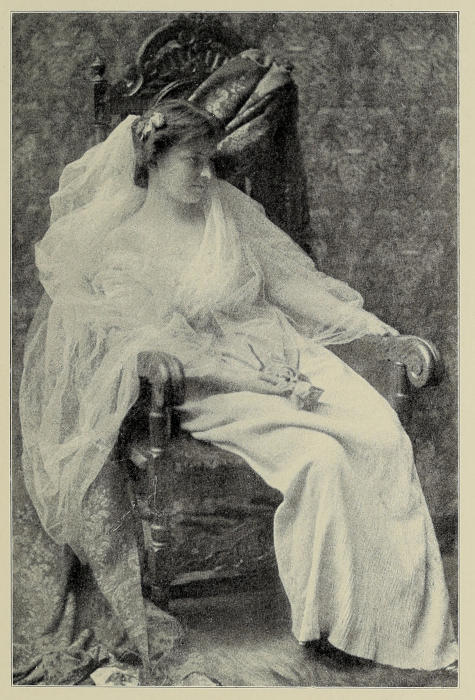
She picked up a book that lay beside her. It was “Monte Cristo.” I had lent it to her the[71] day before when the train boy had nothing more that she wanted. I had seen her read three novels through in one day. Perhaps there was something malicious in this intrusion of a book that she couldn’t finish in a day. Now she was reading from “Monte Cristo”—
“‘A young and beautiful girl, with hair as black as jet, her eyes as velvety as the gazelles, was leaning with her back against the wainscot, rubbing in her slender fingers, modelled after the antique, a bunch of heath blossoms ...; her arms bare to the elbow, embrowned and resembling those of the Venus at Arles, ... and she tapped the earth with her pliant and well-formed foot.’ There you have it,—that is the formula. And wait—here is the other: ‘A more perfect specimen of manly beauty could scarcely be imagined.’ That is the formula for the hero. Do these delight you?”
“Yes; it is primitive, but I like it. I have enjoyed ‘Monte Cristo’ on this journey even for its faults. It is ultimate romance, and I think I like it much better than the ultimate in realism. I like the heroine to be pretty. Unless the author specifically denies it, I always believe that she is pretty. You see I am hopelessly old-fashioned; and you are hopelessly modern. Probably you don’t care at all how the story comes out.”
“Oh, I am not so modern as that! I do care. What I like about realism is that you aren’t so sure how it will turn out. Doesn’t it always seem[72] to you like a waste of time to make them all so miserable when they are to live happily ever after anyway?”
“It doesn’t seem to me any worse than making them happy with the certainty that they are going to be dismal by and by. I suppose I have a serious limitation somewhere, but I should rather see people painfully happy than amusingly miserable, which seems to be the dilemma in which you insist upon finding us all.”
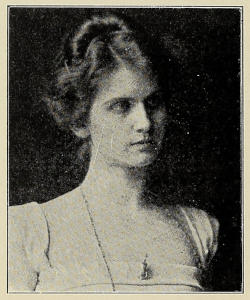
“I am like one of those lawyers who delight in saying, ‘We don’t admit anything, Your Honor.’”
“Maybe you are a lawyer,” I interposed, “and are a heroine because you refused a magnificent retainer for reasons of conscience?”
But she shook her head again. “I was going to say,” she went on, “that romance simply is too sentimental for me. What you would call the monotonous dead level isn’t so stupid as the antirealism critics like to make out. Take the present entirely commonplace incident. I meet you on a railway train. For my soul’s good, you feed me with romance, and exhibit a most entertaining curiosity. Now all that isn’t stupid, is it?”
“Thanks, gentle lady.”
“Then why may we not like in a book the sort of thing we enjoy in life?”
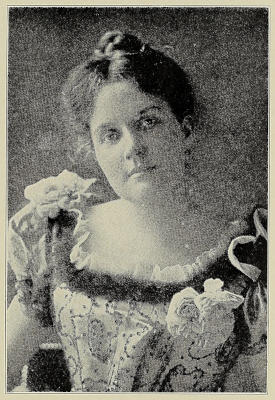
“But I should insist that all this is romance. You are a heroine, and if I am not a hero, I am playing leading man just now, which has great possibilities. We are being hurled through space at a speed of sixty miles an hour. By and by a dark-skinned person will loom at the door and say that dinner is ready in the dining car, and you will let me open all the doors for you to the third coach ahead; and we will eat, drink, and be merry at the parting of the ways, and you will twit me for my New York accent in the most musical dialect that ever was invented by the Anglo-Saxon race. Yet I do not know your name, and you do not know mine. We are two detached fragments of human society appositely placed in a Pullman section, impelled by the social instinct and chaperoned by a corporation. All the elements are modern. Can not[74] you see the very essence of romance in the situation?”
“On the contrary it appears to me as quite realistic. It all might happen any day. I shall go on happening to some one, and you to someone else, every day.”
“I see; it is realism because it will not end anywhere in particular.”
“Will you listen to a fable?” she demanded suddenly.
“Is it a little thing of your own? Of course I shall listen.”
“Once there was a princess—”
“Dear me!” I cried. “I’m sorry for that. Doesn’t a story that begins with a heroine instead of with a hero always end sadly?”
“This is a fable,” she said. “It was a long time ago, when the heroine could be named Maud, though this heroine was not. Well, the princess fell in love with a prince.”
“Do you mean first?” I asked.
“I know what you will say,” she continued, not heeding my interruption. “She should not have loved the prince. She should have loved some romantically impossible person. Anyway, she loved the prince; and more absurd still, the prince loved the princess. You can see how much more artistic it would have been for the prince to have been indifferent. He might at least have had the artistic decency to love the other princess—or to think that he did, which would have done for a while; but he[75] was a nice prince, and he loved the princess. At least, you will say, there should be a parental obstacle, an old fool of a king with other plans. Or it might be an ill-tempered queen with a bad complexion. She would have been useful in a good many ways. But, no; not a single relative opposed either the prince or the princess.”
“Then what on earth did they do?” I asked.
“Happily there appeared a sinister little dwarf. I don’t remember where he came from, but he was U. C. in the nick of time or heaven knows what would have happened. ‘See here,’ said the dwarf, ‘she will be perfectly insufferable if you act in this way. Women are not what they used to be.’ ‘Oh, come now,’ said the prince, ‘I have heard that before.’ ‘I assure you,’ persisted the dwarf, ‘that what women get easily they don’t value at all. You will make her think there are no other fish in the sea. She will expect too much of you. You will never be able to live up to the situation. Moreover, she never will feel the delight of possession that comes after doubt and difficulty. She will sigh for something that can come only after the sweet agony of deferred hope.’ ‘Aren’t you getting rather deep?’ asked the prince. But the dwarf held to the point. ‘Whom Love loveth he perplexeth. First make her doubt,’ he said, ‘or she never will believe.’ Then the dwarf went to the heroine. ‘Your Highness,’ he began, then dropped his flourish, and stepping close to her, whispered: ‘You are making a great mistake.[76] You never can hold the prince. You act like a shop girl who has won the floor walker. You have the engaged look in its most silly form. You threw yourself at him. You know you did. He knows you did. When you are securely married he will act accordingly. Your mother was frantic for him, and has done her best to help you make yourself ridiculous. Everybody is tittering over the way you dote on him. Don’t be a fool.’ Well, if either the prince or the princess had been marrying for policy this chatter would have done no harm. But they were marrying for love, and love has nerves. Love lacks that conservative leash that lies in an extraneous motive; and by an absurd chance the dwarf precipitated an actual quarrel, the prince got to flirting with a middle-aged duchess whom he despised, and the princess, in a jealous fit, gave a peevish, mischief-making dowager aunt the opportunity she long had been looking for, and the match was broken off.”
“Well,” I asked patiently, “who was the dwarf?”
“The spirit of romance, of course, the principle which insists that something shall happen every thousand words—Oh, an entertaining and well-meaning fellow, promising that everything shall come out all right in the end, whatever happens. But you can’t trust him. And if he does fling his hand at the end and assure you that everything is all right, is everything all right? Do the scars count for nothing? Will the interest of joy on the investment of misery prove to be a fair compensation?[79] Realism doesn’t promise so much. Realism doesn’t always insist on a wedding, but may it not say quite as truthfully sometimes that they lived happily ever after?”
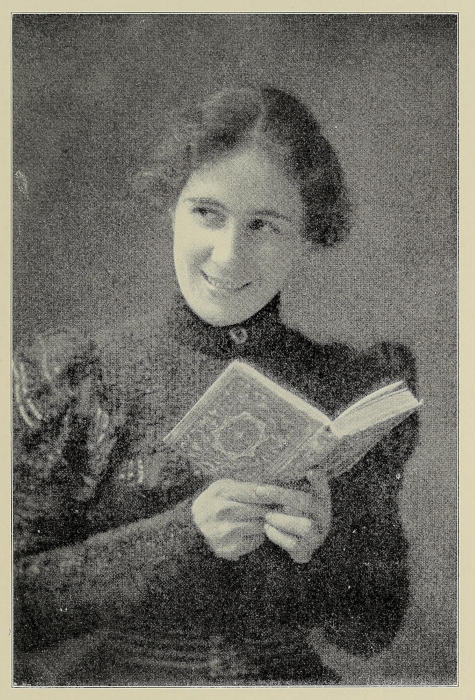
“I like your fable well enough,” I said. “I should reward you by telling another. But it would be a pity to spoil by any attempt at the antithetical the fine neutral effect of your picture. You see, if nothing more happens, it is realism. If they marry after all, it is romance. Do you know that I sometimes have thought that life is so much colored by art that some people are afraid to let matters turn out happily at the end for sheer dread of being romantic. After all, marriage is very romantic. It is so romantic that romance chooses it for the finale, for the supreme reward; while realism every day is insisting that it shall be the dreadful thing that has happened before the curtain goes up. Yes, I know that realism marries too, but shamefacedly, with a reservation. A realistic marriage is as intensely qualified as an emotion by Henry James. You may not discern the string that is attached to it. But it is there. The author likes to leave that reservation rankling in your mind. I love thorough-going romance for one thing: its habit of not annoying you with qualifying elements. It likes to stir things up prodigiously, but it isn’t mean about it. It doesn’t describe a lovely scene and then temper the sentimentality of the moment by having the gardener’s wheelbarrow under the window creak maddeningly. It not only doesn’t[80] mate a little, slope-shouldered hero and a tall heroine with freckles, but it exhibits from end to end that antipathy to what really has happened which is characteristic of all enduring art.”
“You are saying that as if you actually meant it. My suspicion is that your ardor is incited by the spectacle of a woman defending realism. A man likes his heroines to be romantic, that is to say, sentimental. The traditional attitude of a woman is sentimental. The whole structure of a man’s scheme is based upon that assumption. Man doesn’t like to see woman without awe. He doesn’t like to see her belittle the tragedy of life or to hear her say in the presence of comedy, as Stevenson said of his ‘Prince Otto,’ that ‘none of it is exactly funny, but some of it is smiling.’ Yet in spite of your prejudices, I am much afraid that the American girl is a realist. If she consents to glance at romance it must be romance leavened by satire.”
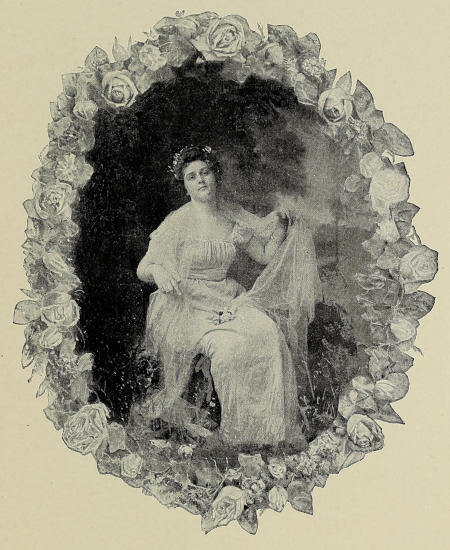
“I wish that I might contradict you, but I fear that Miss America is realistic. The worst of it is, that she makes it become her somehow. But I insist that, broadly, this is wrong. Art and logical realism are contradictions, and despite tradition I believe that the American girl is too reasonable to like unmitigated realism. She is more superbly alive to facts than any other girl in the world, for she reads what she chooses, and, to supplement that uncertain agency, sees pretty much all that goes on in the world. She is not so greatly as formerly[83] under the necessity suggested by Franklin to a woman friend, to ‘have a good dictionary at hand to consult immediately when you meet with a word you do not comprehend the precise meaning of.’ But she is not without sentiment. Her patriotism declares this. Moreover, she reads most of the novels, and most of the novels are not realistic. Now, here is a novel that interests me for several reasons. It is a bright book. It is more than a bright book. It is a strong book. I am going to let you read it if you finish ‘Monte Cristo’ before dinner.”
“Don’t keep me waiting for the name.”
“It has one of those blind names that you like if you like the book. It is called ‘The Sacrifice.’ It has a heroine who has won me completely. With no disparagement to you, she is an American heroine.”
“What is the book about?”
“Mostly it is about this girl, and I assure you that you will not think there is too much of her. You see, I am particular about my heroines. I can go a little haziness, or a little crudeness, in the heroes I read, but I like the heroines—”
“To be like Mercedes?”
“One can’t complain of Dumas there. Mercedes is one of the most human characters in ‘Monte Cristo.’”
“Is there not a touch of satire in that?”
“You have read that book before,” I declared emphatically.
“A long time ago. But let me hear about ‘The Sacrifice.’”
“The heroine of ‘The Sacrifice’—but I should not destroy your interest in the story.”
“Please go on.”
“This girl makes a mistake in throwing over a young fellow—”
“The author begins with an old situation.”
“Yes, but you should see the way he manages it. The girl does not call the lover back, or seek an opportunity to propose to him; neither does she grow sour and leathery. There are certain other reasons why the situation is singular—but you must read the thing yourself. I should like to have your judgment of it.”
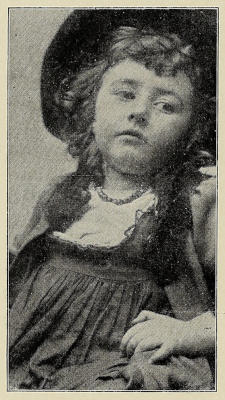
“Why?”
“One heroine’s view of another—”
“Be serious.”
“I comply: Because if you like her, that is to say, if you like the way the author has treated her, the principles you have been enunciating are Pickwickian, which is quite likely. In brief, if you justify the author you have destroyed the justification for your own philosophy, or what has just been passing for your[85] philosophy. After all, I dare say that you are hampered by being a heroine yourself. How extremely odd it would be if you should turn out to be an embodied heroine out of some story—”
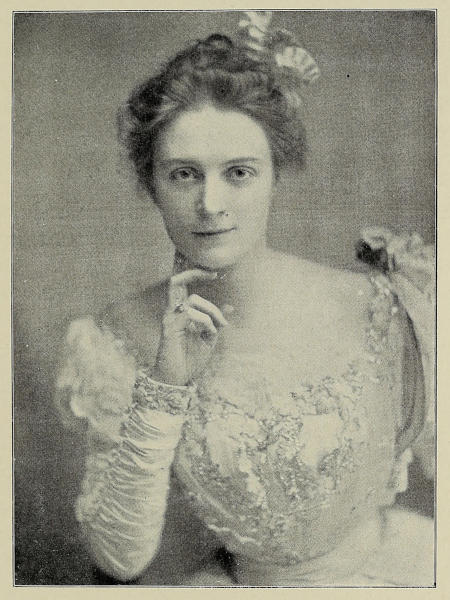
“That would mean that I was out of a romance?”
“Yes, out of a romance,—they are the most real,—and if you should appear in the flesh and exploit your own theories as to how the thing should be[86] done,—only that I should advise you if you are an embodied heroine to go to your own author. I really don’t recognize you as any heroine of mine. Your own author would understand you better—not altogether, but better than any one else. He would know your little perversities, and how to add, subtract, and divide you. But probably if you were a materialized heroine—which might mean, I suppose, that I was the medium and this a daylight séance—you would say what you did not mean,—or, what is so much worse, say what you almost did mean.”
“No,” she said, “I am not a materialized literary spirit. You will not wake up in a few moments and find that I am a bad dream. I am quite real. I could prove this to you by admitting that I am getting hungry. Only a very real woman will admit that she is hungry. Does it not occur to you that we all are living some story, and that some of us who are romanticists at heart live realism by force of circumstances; and that some of us who are realists are forced to yield to the inexorable momentum of romance?”
“Yes,” I said, “and you would be miserable if you were not expressing this paradox. The only way a woman can justify herself for believing in golden knights and the Rubaiyat and the Oversoul is by marrying a soap-boiler who reads Laura Jean Libbey.”
“That is a tribute to her sense of proportion.”
“Do you think so?” I asked her. “Perhaps[87] it is a tribute also to her sense of humor. At all events, a woman generally likes this kind of balance. If she calls a spade a spade she likes to make things even by saying something nice about the hoe.”
“You would appreciate that trait if you happened to be the hoe.”
“Naturally—and growl if I were the spade.”
“Tell me,” she said bending forward, “what sort of fiction do you yourself write?”
“If I must answer,” I said, “I myself am compelled by artistic and other circumstances to write realism.”
She threw herself back in the seat with a laugh.
“I will confess,” I went on, “that I have been suspecting you for some minutes. What sort of fiction do you write?”
She laughed again, then looking at me whimsically without lifting her head she said, “I wrote ‘The Sacrifice.’”...
“This is all very well,” I said, “but you have yet to tell me why you are a heroine. I should like to know how you can be an author and a heroine at the same time?”
“It appears that I can not. I am no longer a heroine.”
“Is this the way you are to get out of it?”
“I am speaking the truth.”
“But not the whole truth. Why were you a heroine?”
“Because I did not bring up the subject of ‘The Sacrifice.’”
I was going to say that to the author of ‘The Sacrifice’ this could be no heroism at all when there was a muffled rattle at the door.
“First call for dinner in the dining car.”
“The coach awaits,” I said.
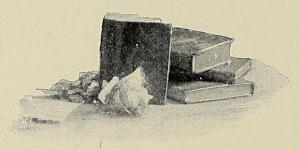
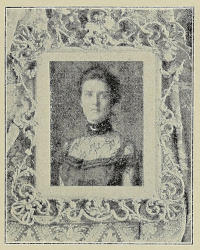
She was a young woman of dainty exterior, with entirely modern appointments in the matter of clothes. She was as Burton would have wished her, “affable but not familiar,” capable of those impersonal confidences that mystify the foreigner and delude even the native. Her effect of being imminent yet so far away, of lurking behind a thin though definite barrier, occurred to me one day when I looked up at one of those emergency contrivances in a railway coach which bear the inscription: “In case of accident, break[90] the glass.” She was intensely equipped. Vast resources gleamed behind the glass. I suppose the impression should have been one of security. Perhaps it actually was the impression that an accident would be a great pity.
It appeared that she had just been to another club meeting. As she always either had been or was just going, the situation occurred to me as entirely normal, unless we accept as a variation the fact that, although the twilight was just falling, she was going to no more that day.
The truth is that we were on the outskirts of one of those intellectual storm-centres for which there are various euphemisms but which are colloquially known as clubs. The hum and tinkle of a refreshment room filtered through a crowded doorway. It was Gentlemen’s Day, and this justified or at least resulted in a certain broader conviviality than was supposed to mark the ordinary refreshment hour, as it had resulted in imparting a touch of levity to the preceding meeting itself.
She herself reflected some of this unseriousness. Doubtless she would have reflected more had she not come from a purely feminine meeting to the tea end of this one.
“You are in deep thought,” she said, “which is very impolite, but I will file your application for forgiveness if you will tell me at once what you have been thinking.”
“I have been thinking,” I said, “that women like one another better than they used to.”
She was trying to put up her veil without setting down her tea, and she could only manage to mutter, “That isn’t saying much.”
“It is saying something pleasant.”
“A man is happy when he can say pleasant wise things to one who will find them pleasant and wise.”
“Now that is flippantly combative, and I don’t deserve it. I have not said anything mean.”
“If it comes to that,” she went on, “your remark seemed to me, or rather it seems to me now that I have had time to get it into perspective, like one of those unpleasant pleasant things that are the most irritating of all.”
“Do you object to my thinking that women like one another better than they used to?”
“No. I only object to your taunting us with it.”
“Will you please—”
“No, I will not explain. It should be obvious that we do not like Man to look down from his parapet and praise us for a purely human trait.”
“Heavens!” I exclaimed, “did I really look down from a parapet? I never should have suspected it. It never would have occurred to me that you would take offence at my simple gratification. Don’t you like to like one another?”
“Stop bantering,” she said in a different tone, with her cup raised, “and tell me whether you really think women are getting to like one another.”
“Think it? Is it not one of those things which we may know by observation?”
“I’m afraid you are deceived. You have inferred[92] too much from the existence of women’s clubs. Women have a great many more opportunities to dislike each other than they used to have. Everything has become complicated. A man should understand. Nowadays there are a great many ways in which women can be disagreeable.”
“There certainly are a great many ways in which they can be agreeable.”
“There is a thorn under that rose, I fancy. I can feel that you have no comprehension of how difficult some things have become. Take the strain we were under this afternoon. Probably I shouldn’t tell you—”
“Then you certainly must.”
“—but we had a dreadful squabble over the question as to whether we should stop letting in the reporters. That question has been coming up at least once a year in the Artemis. It is a delicious sensation to be quoted in eight papers, but it is gall and wormwood to have the hat you wore because it was raining described in one. The other day we found out that those delicately satirical things in the Dynamo have been written by the sweetest little girl you ever saw whom we always supposed was writing the lovely discriminating notices that appeared in the Flashlight. That turned the scale. We voted to be published no more.”
“What a beautiful story that will make for the Dynamo to-morrow.”
“Do you think so? But then they will be through.”
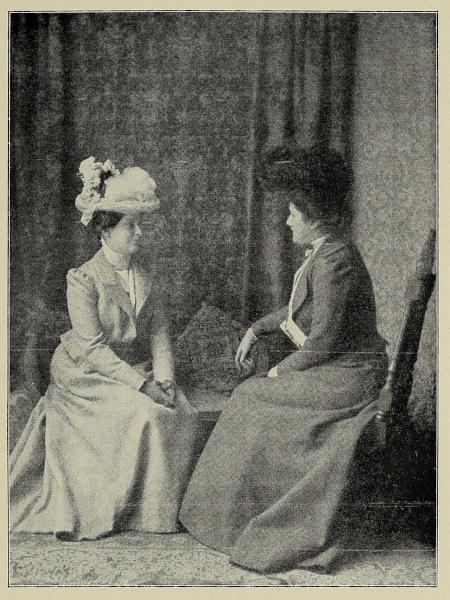
“Perhaps.”
“O, we are going to be very strict! The trouble is that the newspaper people would take some detached part of our meeting and it would look so queer. You see they have a great many meetings to go to.”
“Just like the rest of you.”
“Yes, just like the rest of us; that’s the trouble. And that makes it so hard sometimes. I wanted Mrs. Trimwood to read her paper on ‘Children’s Playgrounds’ at the meeting to-day—it was my committee’s day—and she could read it only at the very last minute, because she wanted to read it at the Pocahontas first.”
“What was the subject of your meeting to-day?”
“Well, we have to be dreadfully careful not to frighten people off. I announced it as ‘The Education of Little Children.’ That sounded well, and there was a good attendance. Of course there wouldn’t have been a handful if we had said ‘Kindergartens.’ You know they are a little tired of that.”
I was staring mutely into my cup.
“Oh, a man’s life is so simple!” she went on. “A man’s club jogs along with about the same membership year after year. With us it is different. Women form a club in a great thrill. They swear, like the soldiers, to fight together until they are all dead, wounded, or promoted. But things change. There are losses, not merely by death and marriage, but by the readjustment of enthusiasms.[96] Take Mrs. Montreville. She was a good member of the Phidias until she joined the Breathing Class. She hasn’t time for anything now but breathing. It is much the same with Mrs. Farlowe. She took up with the Relaxing Club. You know how those relaxers go in for things. Poor woman! I never saw her look so drawn and tired as she has since she went into that. Mrs. Pellmore was sure that nothing would lure her from the Dames. But some one kidnapped her into the Ibsen Club, where they have the most charming times over heredity and microbes, and of course she has no room for us now.”
“I can see,” I said, “that this might make things very difficult.”
“Difficult! Why, the Progressive Woman is a perfect blur. There was a time when all clubs looked alike to women. Nowadays we have become discriminating and there is no peace. The competition is frightful. It is no longer a matter of wafers. You can’t lure them with things to eat. They want sensations.”
“It really is too bad,” I said. “You will have to organize a trust and fight these yellow clubs.”
“As for that, it is pretty hard to find a club without a streak of yellow in it. We’ve got to work in a vein of novelty somehow. They call it making the club attractive. The Phidias went in for Shakespeare at first. Then we found that in order to get new members we had to take up Browning too. That was well enough for a while.[97] When the younger members got restless, we had Miss de Villeforte Volé lecture to us on ‘Degeneracy.’ This delighted everybody except Mrs. Bentwell, who lectures herself on ‘The Ascent of Man.’ After that we had some talks by Professor Prinks on the ‘Marriage Customs of Central Africa.’ There were some criticisms of this. We are bound to have objectors, and sub-objectors—women like Mrs. Prittle—do you know Mrs. Prittle? No? Well, Mrs. Prittle is one of those gorgeously upholstered women who rise with a tremendous rustling and ‘agree with what the last speaker has said.’ Just now there is a row on because some of them want to take up the North Pole.”
“What on earth do they want to do with that?” I demanded.
“I haven’t the least idea. Probably they haven’t. But they would tell you that there isn’t anything else left.”
“Anything else left?”
“You see, things last such a little while, at least with the quick clubs. Why, the Thursday Club did the ‘Origin of Species’ and ‘First Principles’ in one afternoon. We call ourselves very deliberate at the Phidias; that is to say, we never have more than one topic for a meeting; but we shall do Schopenhauer’s works to-morrow morning after our annual business meeting.”
Something in my look must have excited her suspicion, for she went on: “But I absolutely forbid your commiseration. Except for the strain of[98] the competition, it all is very nice, I assure you. We have beautiful times.”
“Of course you do,” I hastened to say. “Even a man can see that. Do you suppose that a man who had done Sienkiewicz and d’Annunzio and Pestalozzi this afternoon, and was going to do Pythagoras, prison reform, the Brahmanas, the Zend-Avesta and bimetallism to-morrow morning, could look as well as you do?”
“I suppose,” she said, looking at me with her laughing, unperplexed eyes, “that we can do these things because we can do more with our subjective minds than you can.”
“So you have been at the Subjective Minds too?”
“One can’t get along at all nowadays without psychology. How should we ever have got back to ghost stories again without it? We had a delightful ghost afternoon at the Artemis. Then it all seems to come in well with the astral body business. Isn’t it a pity that we can’t be in several places at the same time?”
“You wouldn’t ask that the tea-drinking part of us should be in more than one place at a time?”
“Not necessarily. The tea-drinking part of us will look out for itself. Just now you had a far-away look. The other part of you was somewhere else—perhaps at your club.”
“No, no! I never was more completely present in my life.”
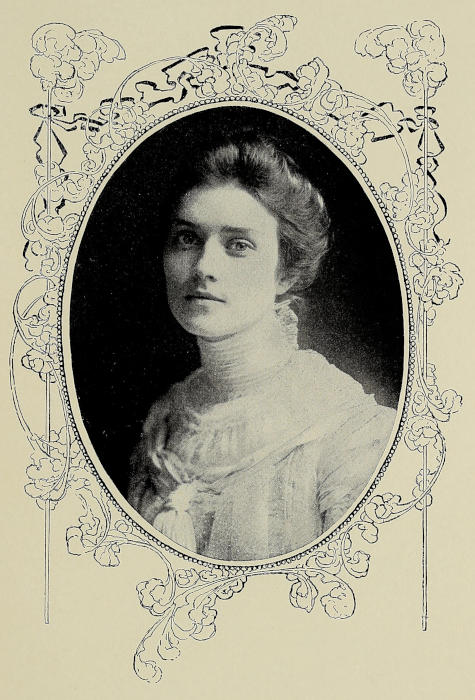
“Anyway, see how nice it would be if that other part of you could be off comfortably somewhere[101] while this part was here, holding an empty cup, and preserving the outward appearance of listening to a young woman prattle about the momentous concerns of life.... Oh, there’s Mrs. Crasker! Do you know her? No? You should. She would tell you the most interesting things. She organized the Zodiac Club last spring and we all were studying the signs for a month or two. It really was wonderful. She told me that as I was a Pisces girl I must marry in the sign of Virgo or Capricorn. It was immensely interesting to study all your friends that way, to see why they shouldn’t have married the one they did. But of course you never could make a club that would stay put on such a basis as that. There was no way of dodging the facts. One may forget one’s age, but one can not elude one’s birthday. And there is no way of shifting it. When the woman whom we elected Vice President turned out by her birthday to be under the sign of—Taurus, was it?—it upset her to find that she must be inordinately fond of dress, that she would do anything for clothes, and so on. Why, it was like turning the X-ray on us. And we found that we all were wearing the wrong colors. The deeper we got into the thing the more impossible it began to seem that we ever should club well together, however much the awful discoveries might be expected to affect the general question of friendship.”
“I will forgive you everything,” I said, “if you will entertain and enlighten me with an answer to[102] a momentous question, namely: How are clubs to be explained—by which, of course, I mean feminine clubs.”
For answer to this she gave a little laugh which at first I was at a loss to explain. Then I saw she was looking across the room toward a tall, rather heavy woman encased in black jet.
“There is a woman,” she finally said, “who might give you one answer to that question.”
“Do you mean that now you are going to give me her answer?”
“I could only guess at that. But I might tell you a story.”
“About her?”
“About her.”
“That wouldn’t be gossip, would it?”
“Oh, no! it would be history. You know her name is Ellen—Ellen Brotcher. She was a Miss Gatt. I’m sure she always has wished that she was a Louise-Florence-Petronille-Tardien d’Escavelles or a Julie-Jeanne-Eléonore de Lespinasse. She was very ambitious. That is to say, she thought she was—coaxed herself to believe that she was. It all began by her taking up French; perhaps I should say, taking up a little French professor, a funny little man who looked like a waiter and talked like the man at the silk-counter. I don’t want to be mean about him, either, for he is a nice enough man, I understand; but he began to seem very funny somehow, after Mrs. Brotcher took him up. First they organized a Cercle Français,[103] at which they started out to talk nothing but French, but at which they presently settled down to hearing the Professor read La Fontaine, which, as you might fancy, began to seem like a tepid form of dissipation after a while. Nothing but the splendid enthusiasm of Mrs. Brotcher kept the thing going as long as it did go. When the Cercle melted away, Mrs. Brotcher seems to have made her great resolve, which was to have a salon. Now, I know that that sort of thing has been tried before, but really no one that you ever heard of ever went into the business as desperately as Mrs. Brotcher. She trained for it in every way that a woman could train for such a thing, and I haven’t the least doubt but that she saw a refulgent success very clearly outlined before her. Other people have started Americanized versions of the salon idea. Mrs. Brotcher believed that the idea would go if it was done more closely after the true French pattern. She had studied the whole matter and knew what she was about. She knew all the traditions of the Hôtel de Rambouillet and of the Hôtel de Scudéry. She knew all about the methods of Mme. de Sévigné, of the Grande Mademoiselle and the Duchesse de Longueville. And she made up her mind to have Samedis. That night seemed about the best night on which to hope for busy men, and the men she would have to depend upon would be so much busier than any that ever had filled the Salon Helvétique. She wanted to have Sunday nights—are you listening?”
“Listening? Can’t you see that I am absorbed?”
“She wanted to have Sunday nights, but her mother is an anti-Briggs Presbyterian, and she thought it would be best not to tempt Providence—her sister-in-law afterward told me this herself.”
“Just like a sister-in-law.”
“Besides, her husband always went to something or other that he belonged to on Sunday night—yes, I know it was very bad form from a salon standpoint to consider him at all; but you see she didn’t want it to look as if she had picked out the night when he had to be away. And the Samedis did sound well. The first Samedi was a great success. Mrs. Brotcher wore a light mauve princess dress that was made for the occasion. She got together fifteen or twenty men somehow, and an elderly French woman, a rather lively widow with a sense of humor that would have been useful to Mrs. Brotcher, gave some admirable assistance in managing the crowd. By a happy stroke the French professor brought with him a young Frenchman who called himself the Comte de Trouvel, or something of that sort. Ed Tranton, who was there, and who didn’t miss anything, said that it was killing to see Mrs. Brotcher, who remained seated, motion the count to a seat on the fauteuil beside her. Her plan for sitting like a sovereign was really quite wise for her. She is a trifle heavy, and her awkwardness has the finish that comes with a little Delsarte. Her method of sitting down always makes me think of a hotel bus backing to a carriage[105] block. You never could appreciate the fun of this unless I gave you some of these details.”
“You are living up to your notion of it as history.”
“If you are not very appreciative the historian—”
“I am listening.”
“Ed Tranton says that more of the men talked to the lively French widow than seemed to him to be exactly symmetrical, but Mrs. Brotcher did not appear to care so long as she had the count. When Ed Tranton got into the Brotcher group, Mrs. Brotcher was saying to the count with a flip of her fan—I can just see it!—that she didn’t consider his behavior quite propre. The count roared and cast a longing glance toward the widow as if he couldn’t wait the chance to tell her. Poor Mrs. Brotcher meant convenable or comme il faut, of course. I doubt whether she ever knew why the count seemed so much amused. To her the evening was a brilliant, an epoch-making occasion. During the following week she greatly elaborated her plan. Her sister-in-law says that she felt the need of having one or two stars every night, like the count, who had enthusiastically promised to come again on the following Saturday. Mrs. Brotcher had cried over Mme. Roland and made up her mind to keep out of politics, though I fancy she did not see any immediate danger in any politics that was at all possible to her salon. Her idea was to go in for as much literary effect as she could[106] get with a sprinkling of counts, colonels, professors, and judges. Naturally things couldn’t be as picturesque as when women wore high-waisted gowns and men imitated Napoleon. It was too bad not to have an abbé. I’m sure she wanted an abbé, in a circle of beaux esprits. A petit souper was planned for the second Saturday,—they had plain refreshments the first night. Well, the second Samedi came and with it the Professor, who apologized for the indisposition of the count, and little Dawlin of the Dynamo, who was to read some vers de société. That was all. The heart-breaking thing was that Brotcher, who had found it impossible to be present on the first occasion, appeared at the second Samedi to see what sort of an affair a salon was. Mrs. Brotcher wilted; but she revived somehow and appears to have expected great things of the third Samedi, which came with the Professor again, and Dawlin, and a Judge Troot, who had been asked alone, but who brought his wife. It was pitiful. Brotcher grinned over it, and told Mrs. Brotcher, it seems, that he thought she had better give up trying to be ‘saloon-keeper.’ But Mrs. Brotcher was hard to crush. She complained that so many of the nice men were married, and that you couldn’t get them very well without their wives, who quite plainly were impossible to a salon. On the other hand, the single men who were worth having seemed to be wedded to clubs. Even petits soupers would not fetch them. It was not for two or three months that Mrs. Brotcher[111] gave up her dream. I believe the failure was a real grief to her, and she has thrown herself into clubs as if to blot out the past.”
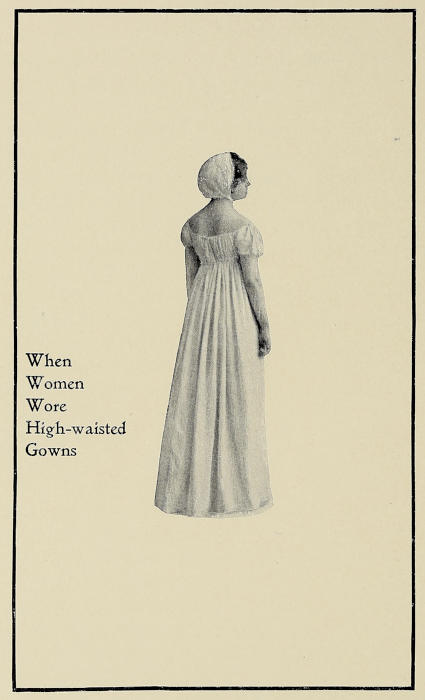
When Women Wore High-waisted Gowns
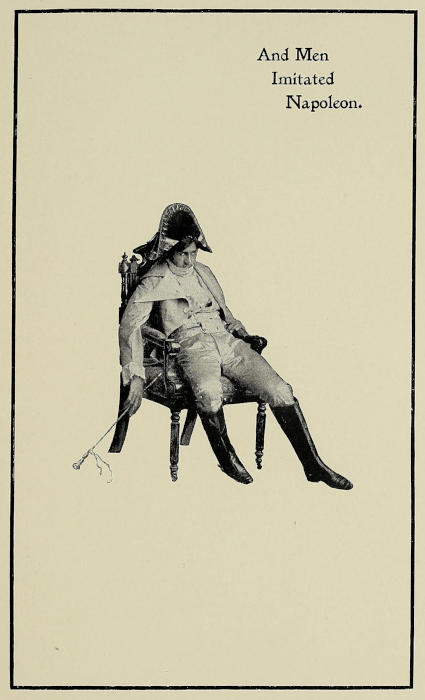
And Men Imitated Napoleon.
“Well,” I said, “that seems to me a better explanation of why we do not have salons than of why we do have women’s clubs. There were men’s clubs at the time of the salons; and I think we may say that the salons stopped before the feminine clubs began.”
“Have women taken up with one another because they had to? Is that what you are going to ask? No; we have taken up with one another in this modified sort of way for the same reason that the blacksmith whipped the parson—because we wanted to and because we could. The salon never kept many women busy, but the decay of the salon was one more reason why there should be women’s clubs. The logical thing was bound to happen sometime: clubs for men, clubs for women, clubs for both—society being in a sort of way the club for both.”
“That is logical,” I admitted. “That is to say, it has a nicely balancing sound, which is the same thing. Then there is a fine balance in other ways, as we may observe every day. We have a dozen men to one woman in political boards, and a dozen women to one man at prayer-meeting. In each case the minority undergoes a trying test.”
She laughed an unresentful laugh.
“I hope you won’t think me irreverent,” I said, “in suggesting that the same test is imposed upon[112] all clubs alike: What is our condition when we leave them?”
“In that case,” she answered, rising. “I’m afraid we shall be obliged to decide that this club may not have been entirely good for you.”
To which, naturally, I did not agree.
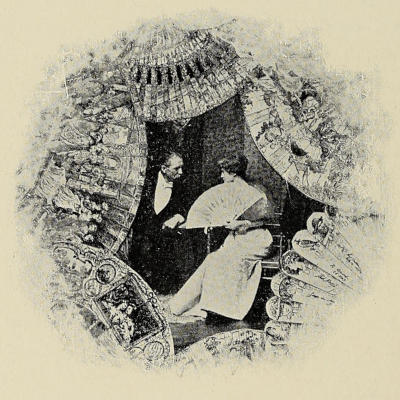
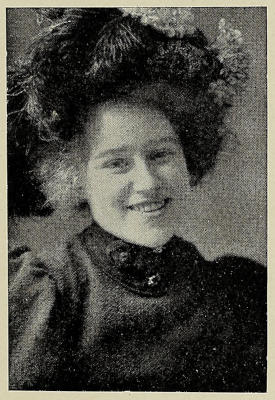
There is in Chicago a certain street corner around which the Lake wind, which already has made some progress through the city, swings with a zest that might indicate an intention to illustrate in a grotesque continuous performance the Lake wind’s utter irreverence and frivolity. Most Chicagoans know the wind’s mood at this corner, and when you sit in the window of the club it is quite possible to pick out the frequenters of the district by the mechanical way they grasp their hats as they approach the known border of this current of air. You may tell those who are Chicagoans yet not frequenters of the district by the fact that this gesture is delayed until a hazardous last moment. The foreigner, hit unawares,[114] often is placed in a pitiful plight. I myself, a foreigner to these scenes, staring through the club’s broad French plate, in the space of half an hour saw a dozen hats whirled at a uniform angle across the tumultuous street.
It was while I was sitting at the club window, not a little uncertain whether it was not malicious thus to become the spectator of my fellow creatures’ misfortunes, and wondering whether the municipality did not owe it to itself to place a signpost or a large policeman at an effective angle to this corner, when I saw young Mrs. Fentley approaching. I had time to notice that Mrs. Fentley wore a pretty fall gown, one of those defiantly subdued rich gowns, and that she was holding it inelegantly, for her, as if she were in a hurry, when a most extraordinary thing happened. A great many hats had blown off; but they were not the hats of women, and no precedent or procession of disasters could have prepared me for such a mishap as the sudden careering of Mrs. Fentley’s hat.
In the face of this unspeakable occurrence I sprang up and stood in a moment of doubt as to whether it would not be the more kind to Mrs. Fentley to sit down again; then rushed through the corridor and out-of-doors, across the street, under the nose of an express horse, and found Mrs. Fentley’s hat miraculously whole at the opposite curb, just as strange hands were about to seize it. This might have seemed tragedy enough; but when I looked up toward Mrs. Fentley I saw by an unmistakable[115] gesture of her free hand that her hair was hopelessly loosened.
The affair thus having reached its worst possible stage, I approached Mrs. Fentley, bearing the hat in that tenderly wrong way common to all men who attempt this office, and exhibiting in my countenance a properly profound distress.
The first thing that Mrs. Fentley said was, “Please stop that hansom,” a request to which I attempted to accede without delaying the transfer of the hat.
“You must come a little way,” she said as she slunk gracefully under the hood of the vehicle. I obeyed the command with some incoherent expressions of solicitude, leaving the driver to remind me that he did not know what he was to do with us.
“I am not going home,” said Mrs. Fentley. “Tell him Ammerlin’s. I have several errands, and as you evidently were only mooning at the Vulcan, I think you might go along.”
“And hold your hat.”
“And hold my hat. I was going to that district messenger office back there to send word over to Mrs. Linford that I couldn’t come, but I am going now, just to be obstinate. There, you may let me have my hat. Did you ever see anything so humiliating? I never expected to see it whole again. Why, it seemed to scud right under the feet of a horse. And to think that you should have seen the thing happen—”
“And sprang into the arena to rescue it.”
“Such a thing surely never happened to any one before. I hate wind. It is so vulgar.”
“Yes,” I said, “especially when it is in an ill-bred hurry. But really you have been in Chicago long enough to know that corner.”
“I know. But I was thinking of something else—”
“And hurrying a little yourself.”
“Well, it seems to me that I never knew so many things to come up. And I don’t see why I do hurry. I never get through, and if I did I should think it hadn’t been worth while. There are a great many things a woman would like to do if it were not for the others who are dipping into the same thing. You have no idea how disagreeable some women are, with other women. There is a woman on our advisory board at the Twilight Home who is ingeniously doing everything she can to make the institution ridiculous. If it wasn’t for giving her too much satisfaction I should get out of the board. She is Dick’s aunt, by the way, and I believe it really grieves her that she can’t manage me. There are three old women and four old men in the Home now. There would be as many more if Mrs. Gritts didn’t have a theory of receiving only select indigent. It costs about two thousand apiece to maintain these seven. They are all so particular that it requires the nicest discrimination to shop for them. I have just been buying socks for our oldest and most particular man. Probably he won’t wear them. He says he prefers English[119] hose. We have his shirts made to order, and he grumbles that they are infamously devised. If there is anything they don’t grumble at Mrs. Gritts thinks up something new for them.”
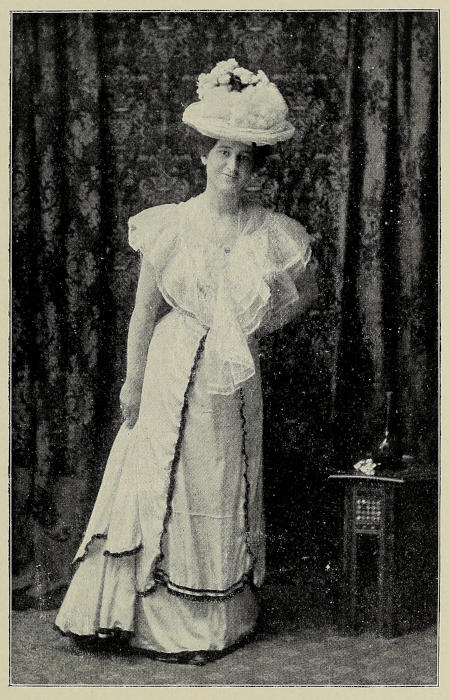
“But how does Mrs. Gritts hold her majority of the board?”
“Oh, they all are afraid of her. You see, she got the endowment.”
“And she wishes to see it all spent.”
“It isn’t so much that, as it is that she wants it spent her way.”
“Well, her way seems to be very nice for the old ladies and gentlemen. I am going to keep my eye on your Home. Does Mrs. Gritts have any objection to a literary past?”
“I fancy it would not commend you. The fact is that Mrs. Gritts is much influenced by the candidate’s appearance.”
“How unfortunate!” I said.
“There was an application yesterday in behalf of a desperately needy old fellow, but what hair he has left is red, and Mrs. Gritts put her foot down. He simply did not fit into her scheme of the pictorial effect. All of our people have that silvery, well-bred-pensioner look.”
“But where does your fun come in?” I asked, with real curiosity.
“Oh, I don’t know. I inherited a lot of charities from my mother. Here’s Ammerlin’s. Will you wait for me? I shall only be a moment.”
“More socks?”
“No,—some new curtains for the Directors’ room at the Littlewick Hospital. You must wait. I haven’t seen anything of you, and you will be running back to New York. You might as well wait here. I know how men hate these stores.”
“If you insist upon my not going with you—”
It was thus that I happened to be sitting in the hansom when Dick Fentley came hustling up the street.
“Hello, old man!” he shouted. “What the deuce are you doing here?”
“Waiting for your wife,” I answered.
“Just like her,” he returned to this. “Where is she taking you?”
“I haven’t the least idea,” I replied. “I fancy nowhere in particular, but I am not sure. Do you think it would be right for me to ask her?”
Dick laughed. “You’re safe! But if she tries to spring any infirmaries or kindergartens on you, just bolt. Tell her I said she was to fetch you home to dinner. Making you comfortable at the club?” and Dick was off up the street just as Mrs. Fentley came out of Ammerlin’s.
“Do you know,” I said as I followed her into the hansom again, “it scarcely seems as if you had had time to transact very much business.”
“I didn’t give you time to become impatient, did I?”
“No; I passed the sixty seconds very pleasantly with your husband.”
“The idea! Dick passed here? That means[121] that he is going to spend the afternoon with Bob Haverton somewhere.”
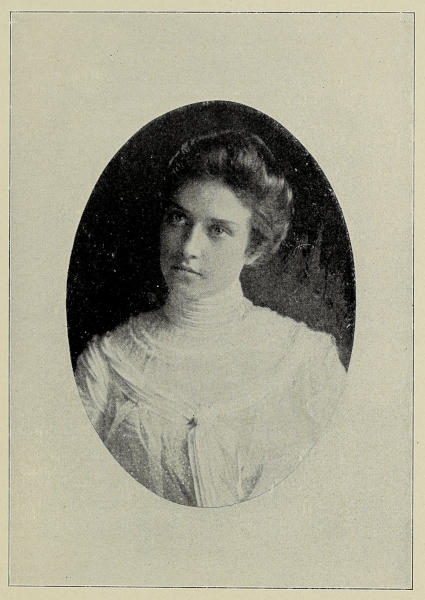
“Isn’t Bob proper?”
“Sometimes. I fancy Dick gets most of his stories from Bob?”
“Aren’t they proper?”
“Sometimes. Oh, Bob is a very handsome fellow. He was in the navy at one time. He was an Ensign—what they call an Insect in the navy. Then his father died and left him a lot of money. Now he is occupied with the problem as to which girl he will let have him.”
“I suppose they all want him?”
“Naturally. Whoever gets him will have a dreadful time. He is very handsome.”
“I have known cases—” I began.
“Yes, but the chances will all be against her. A really handsome man like Bob simply invites disaster. It is not at all the same with a handsome woman. The whole mechanism of society is constructed with a view to watching the handsome woman,—relatives, neighbors, other women in general all watch her. But there is no one to watch the handsome man but his wife.”
“I can see,” I said, “how that might be too much for one woman. And yet I can see chances for assistance from other women.”
“Not from disappointed ones. The disappointed ones hate the handsome man’s wife worse than the others do. No, she is bound to fight the thing out for herself.”
“Well, most people get over it.”
“Get over what?”
“Being handsome.”
“Yet women have the worst of it again. The handsome man lasts longer somehow.”
“Should you call Dick a handsome man?”
“Certainly not. Dick is a good fellow, but no one ever accused him of being handsome. You should have known that I couldn’t possibly be personal.”
“O, I did, from my side.”
“Don’t be malicious. The first case I ever knew was of a classmate of mine, a lovely girl. Do you know, I was present at the beginning of a most dreadful quarrel, after she had suffered everything. Well, he went to the d— bad, and she went to Lenox; and they both came back and patched it up somehow.”
“I can imagine your balancing in your mind four years ago the arguments in favor of the proposition that Dick was handsome enough to count.”
“Nonsense. I never thought of such a thing then. I have learned a lot in four years. Mother says I am a cynic.”
“What does Dick say you are?”
“Dick says I am a woman.”
“I hope this hasn’t resulted from your coming to Chicago—I mean your being a cynic.”
“I scarcely think so. Do you know, Chicago is much less sentimental than New York. That struck me when I first came here, and every time we go to New York I am freshly impressed by the fact.”
“I have never thought of New York as especially sentimental.”
“Perhaps you wouldn’t unless you definitely compared it with some other big city. You know what I mean,—in the matter of the sentiments. Chicago seemed to me désillusionné. It hasn’t had to take time to get through with some things, because it never began with them.”
“I suppose that you feel that Chicago is a little cynical, too.”
“Well, it is awfully hard to fool Chicago.”
“Do you suppose your old ladies and gentlemen think so?”
“I suppose you never will get through laughing at that. They really are a good joke. But we have a certain amount of fun out of them after all. I’m not like those women who only care for the games they can win at. I’m satisfied to squeeze a little chuckle out of circumstances. I don’t expect too much. Take matrimony. Some women think it is a poor game simply because they haven’t been able to win at it. And it is the same even with religion. The other night our bishop was telling me about the diminishing congregations. I told him that the church people were not keeping pace with the spirit of the time. ‘The trouble with you, Bishop,’ I said, ‘is that you don’t advertise. Look at Talmage.’ ‘My dear,’ he said, ‘we do advertise somewhat, and we have one bargain day every week. We call it Sunday. But people are becoming dreadfully exacting. And our stock is very old.’ You can get a good deal of comfort out of the church if you look at it as[127] Renan did—as an institution for keeping other people quiet.”
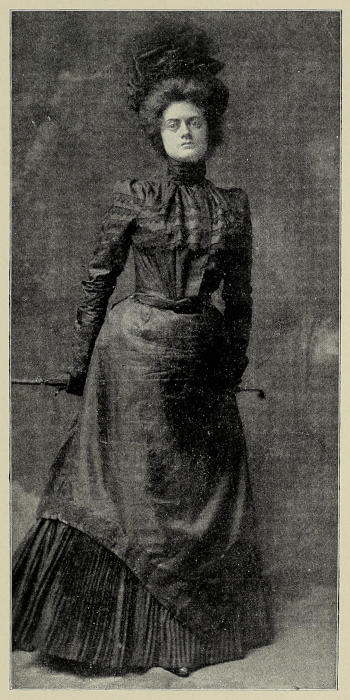
“And yet,” I ventured to say, “there are folks who think that you young women should go to church more than you do.”
“Oh, I do go to church. But I don’t take it seriously. I’m afraid I only glance at the bargains and go out at the other door.”
“I dare say that you wouldn’t accept heaven unless there is an elevator, a writing-room and an orchestrion.”
“Do you know, I fancy a good many of us think of the church as Mrs. Stellmore feels about her husband. Probably you don’t know Mrs. Stellmore. She is the second wife of one of our wealthiest brokers. The other night she walked up to him right before us all, and putting her hands on his shoulders said, ‘Oh, Tom! if you weren’t so good I couldn’t be so wicked.’”
“I am going to ask as the foreigner who is writing us up so often asks: Is this typical? Are many of your husbands, so to speak, so good as Mr. Stellmore?”
“I suppose you mean, good in the ways that will let us be wicked. I’m afraid a good many of them are. You see they are too busy to bother very much with us, and we are deep in all sorts of charitable and intellectual debaucheries. Then it is too late to try and reform us. But I was going to tell you about Mrs. Stellmore. She is very entertaining, and especially to her husband.”
“Surely that is an admirable trait,” I said.
“Oh, Stellmore knows what he is about when he lets her run around. She fetches him the most interesting stories. One afternoon I heard her say, ‘Well, I must go and chase up something to amuse Tom with.’”
“It seems to me I have heard of that theory before, about the wife not staying home where there will be no news but the ill temper of the cook and the atrocities of the furnace, but going forth into the world, as she does, and bringing home something amusing or instructive.”
“Maybe; but you never saw the scheme worked out so gayly as Mrs. Stellmore works it out. Of course she has a good time.”
“Does she like his being so wonderfully willing?”
“Now that is cynical. No, she doesn’t seem to mind it. She really likes her husband, and his goodness is a continual source of interest to her. She is very shrewd. When I had that dreadful psychological young woman to lecture at the house one afternoon I was telling Mrs. Stellmore what a fizzle the thing had been. ‘And yet,’ I said, ‘she had the most gorgeous recommendations.’ ‘My dear,’ said Mrs. Stellmore, ‘are you not aware that no women can get hold of such gorgeous recommendations as those who do not deserve them?’ Yet she is a thoroughly generous woman.”
“Is she pretty?”
“Not especially. She is a very decided blonde.”
“The wicked dye young.”
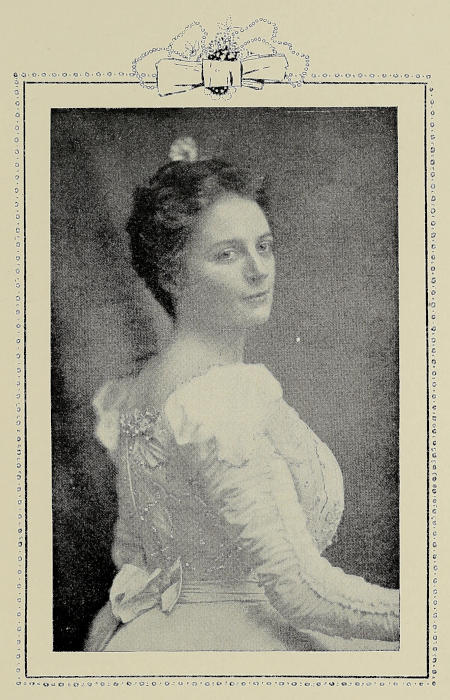
“But she is the real thing. That is the way with a good many of her other traits. She is more genuine than she gets credit for being. If it comes to that, society is very cynical. It is always suspecting a bleach.”
“I am sorry to have suggested the cynicism of society. I fancy you feel toward Mrs. Stellmore as I sometimes feel toward Stenson. Stenson—Dick knows him—is one of the cleverest men you ever would be likely to meet. He has been everywhere, has seen everything and everybody, and has the most entertaining stories to tell of any place or any person you are likely to mention. Now, of some people you have a fashion of saying to yourself, ‘He is probably lying.’ But with Stenson you have an uneasy feeling at the thought that probably he is telling the truth.”
“Then I should call Stenson a sort of personified newspaper. That is the way I always feel about newspapers. It is very annoying.”
“But that is an unwholesome attitude of mind. Every woman should believe one man and one newspaper, just as every man should, and I believe generally does, believe one woman and one newspaper.”
“What an extraordinary theory.”
“Mrs. Fentley, that is a good working philosophy. There may not be either one man or one woman who is worthy of such an unvarying faith, and for the same reason it is possible that there is not one newspaper that uniformly is worthy of belief.[132] But that does not affect the matter. It is a case of being comfortable.”
“Pardon me, but it looks to me more like a case of being fooled. Now my theory—”
“As a cynic.”
“—as a cynic, is to have reservations. Of course I never could quite believe my mother, for when I was wicked she never quite carried out her threats. I can see now that she was wise in having her reservations, too. Her theory was dangerously severe. Her practice was wiser.”
“You judge by the results. She would value your praise.”
“Oh, I often have said this to her. Then, my teachers were frequently mistaken.”
“Did you tell them, too?”
“Certainly,—in my nice way, you know. Then Dick,—I never could be so much in love with him that I should not know that he had reservations. Once, when we had been married about a year, Dick came home very late, and I asked where he had been. You know how young I was when I was married. ‘Why, Ethel,’ said Dick, ‘you wouldn’t believe me if I told you.’ ‘I should,’ I said, ‘tell me where you have been.’ ‘Now Ethel, why do you ask me that? I know you wouldn’t believe me.’ But I persisted. ‘I promise you, Dick, that I shall believe just what you tell me.’ ‘Well,’ he said, ‘I have been down to the Young Men’s Christian Association.’ I never bothered Dick again. That is the next best thing to your[133] philosophy, I suppose. It is about my mother’s point of view. She used to say that a good way to make a child a liar was to force an issue when there was nothing to be gained by it.”
“That is why you do not force issues with Dick?”
“Precisely. And that is why Dick lets me alone pretty much.”
“I see; this is what we may call applied cynicism. Though I should think that Dick might have more than one reason for not asking you where you have been. You never could finish the story. And by the way, do you mind telling me where we are going? You are keeping me in dread lest this pleasure should be interrupted.”
“We shall be at Mrs. Linford’s in two minutes.”
“What shall you do there?”
“I shall assist Mrs. Linford in managing a British lion.”
“A what?”
“They say he is dreadfully brutal. It will be so nice to have you to help stroke him.”
“But—”
“Oh, Mrs. Linford will be delighted. Though perhaps you had better not mention books to him. They say he simply hates other literary people. And Mrs. Linford warned me not to speak of railroads. It seems that he grows absolutely cataleptic at the mention of American railroads.”
“That is one of my favorite themes. You had better leave me outside or let me go back to the Vulcan.”
“Nonsense! Here we are.”
The lion had not come, and was not coming. They said it was just like him. Yet they seemed quite unhappy.
“So that now,” said Mrs. Fentley an hour later, “you are going home to dinner with me.”
“Yes,” I returned, “Dick said I was to bid you fetch me. It is very nice to have you guess his wishes this way. But mind you, I shall be quite unmanageable if you mention the subject of Lake winds!”
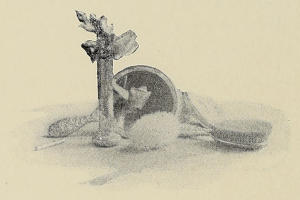
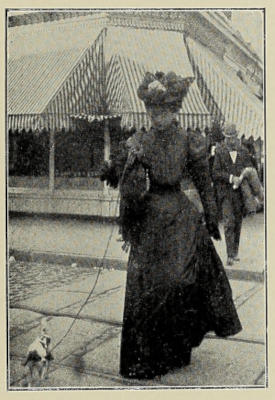
They all had climbed down from the coach but Miss Rittingway, the Judge, and myself. Some of them had gone over to the ball game in which young Medrick was to play. Others were at the stables. The Grifton girl and Mentley were strolling among the booths. The Judge had asked Miss Rittingway to go with him and see the fruit exhibit, and Miss Rittingway had begged off. “I am going to sit here for a while,” she said in her quietly conclusive way.
“But what did we come to the Fair for,” demanded the Judge, “if not to run about and see everything?”
“My dear Judge,” returned Miss Rittingway, “I don’t forbid you to run about or around and see everything.”
“I wish you would,” said the Judge. “I need minding. I am dying to be bossed by somebody. I heard some one say that you were the chaperon in this miscellaneous party, and there isn’t a member of the outfit who needs your gentle guidance, your subtly restraining influence more than I do. It is positively wicked to turn me loose at a county fair.”
“I’m awfully sorry, Judge,” returned Miss Rittingway, “but really I never agreed to chaperon you.”
The Judge cast an appealing glance at me. “Oh, I don’t blame you!” he said, with a mischievous twitch in his eyes, “and I’m coming back, unless my unrestrained career ends in disaster.”
We watched the Judge until he had disappeared in the crowd.
“Do you think the Judge will marry again?” asked Miss Rittingway.
“Of all questions,” I replied, “that is the one I am least fitted to answer. I have positive reverence for one who is capable of successfully making that variety of guess. I represent an extremely crude form of the prophet. When the sky is filled with extremely dark clouds I think that it may rain. That is as far as I have ever been able to go.”
“Well, I was wondering whether you had noticed any rather dark clouds in the Judge’s sky.”
“I can’t say that I have. A woman has better sight for those things. She can see a cloud when it isn’t bigger than a woman’s hand.”
Miss Rittingway smiled. “A prudent prophet,” she said, “always notices the direction of the wind, and avoids being misled by the youngest inhabitant.”
“Should you say that the Judge’s general amiability indicated anything favorable to matrimony?”
“No; never that in itself. General amiability in my judgment even may be taken as an opposing sign. It is particular amiability that counts.”
“Hasn’t the Judge been particularly amiable to you?” I asked.
“Nonsense. The Judge has talked somewhat to me because I am the most detached member of the party. The Judge is a judicious man. He enjoys going through the motions of being reckless with me because he recognizes me as safe. I am very safe.”
“I suppose I should know what that means. It is something nice, I hope.”
“It is a neutral quality. It hasn’t anything to do with niceness or the other thing so far as I can see.”
“But if a person were safe and nice that person would, I should say, be the sort of person with whom judges would like to be particularly amiable. That seems clear enough. But what is this safeness? How does it feel? Of course it isn’t complacence or anything of that sort.”
“It might be, I suppose. Sometimes I resent[138] it—being regarded as so safe. That might suggest that I am not complacent about it.”
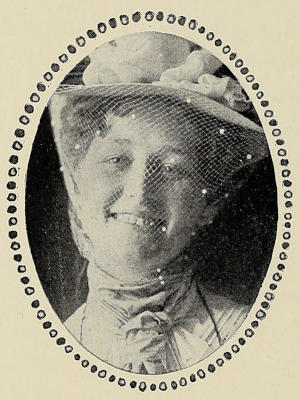
Miss Rittingway was holding a pink parasol between her and a brilliant but not vehement sun. The faint flush which she gained from the silk glorified a naturally brilliant complexion. Miss Rittingway was easily the prettiest woman in the impromptu and somewhat heterogeneous coaching party. I had been conscious of a certain quality in her which, now that she had used the word “safe,” made her more enigmatical than before. It was evident that her safeness was something more than discretion, a quality which we find so happily illustrated in the American girl. It was not merely a sense of proportion of which her sense of humor gave so true a sign. Her attitude of mind made me think of the remark of a modern dramatic teacher before a class of young women. “Ladies,” he said, “you always must distribute yourself over the centre of gravity.” At the first sound of it the admonition seemed mystical and empty enough. But when he went on to explain his admonition it began to seem more mundane and applicable. No pose, he told them, could be or could seem natural[139] and finished which did not establish an equation with the law of gravity. He showed that every plant or tree, every bird on a bough, naturally and inevitably attained a balance, and that art, continually, in every department, sought this effect of balance, of visible relation between action or repose and the obvious centre of gravity. All of which is apologetically interpolated for the purpose of suggesting that Miss Rittingway’s mental lines appeared to be beautifully distributed over the centre of gravity. A little severity to the northeast was always balanced by an alleviating grimace to the southwest, and her contagious laugh never left a doubt of the reserve assets.
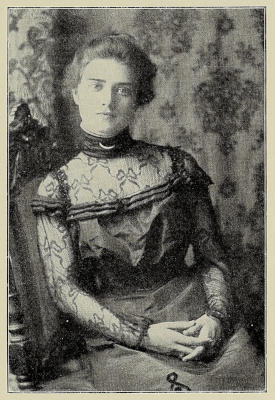
“But,” I said to her, “you should be married. If you are a predestined chaperon you should outwardly conform to the conventions by reason of which there is such a thing as a chaperon. Society and the dictionary expect you to be married. They[140] do not insist, any more than society does in the case of the parson and the doctor. But they favor and expect.”
“You see I am in my novitiate,” said Miss Rittingway, looking at the palm of her left glove. “I am not yet ready to take the veil.”
“Meanwhile,” I said, “you do not seem to have accumulated any prejudices against the office. It sits lightly upon you. The robes of your responsibility flow gracefully. There is something which I have no doubt is typical in your unmarried chaperonage. You may not suspect just what there is of end-of-the-century character in your situation. We have had a lot of talk about chaperons, from which one might think they had just been invented. I am wondering whether you have any definite theories about chaperons.”
“I’m afraid I haven’t. I don’t think they are an altogether foolish idea, and I don’t think that they can be taken quite seriously either—perhaps I mean solemnly. Certainly a chaperon who took herself solemnly would scarcely fit into our American scheme.”
“As for that, no one who takes himself solemnly fits very well into our American scheme, though I have noticed that we Americans take many things seriously which we assume to carry with lightness, even with levity. I often suspect that we differ more from other peoples in our insistence upon this appearance of lightness than in our actual social qualities.”
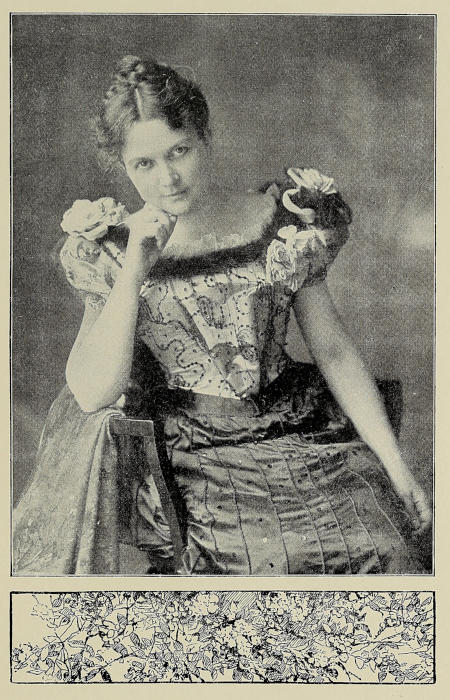
“But isn’t that a social quality with us?” demanded Miss Rittingway, “this insistence upon an external lightness? The American is funny about some things.”
“I presume he is a bigger humorist than he commonly suspects.”
“He hates to admit that humanity is about the same sort of thing here as elsewhere. He despises the old labels. He believes in liberty as if he had patented the notion, and wants his children to have lots of it; but he is undoubtedly the most cautious parent in the world. He says we have no classes, and leaves the foreigner to find that we have classes as definitely set as any in the world.”
“Dear me!” I cried. “Is he so sophistical as that? If the American parent is cautious he is cautious in a very liberal way. There is the Grifton girl—”
At this I saw Miss Rittingway’s eyes wander in the direction of the booths as if it might be possible to estimate the situation of Mentley and his companion.
“The Grifton girl,” I said, “is a very modern daughter. I should fancy that she was somewhat difficult. I mention this because it has appeared that you have a particular interest in Miss Grifton.”
“I have. In a particular sense I am the chaperon of Miss Grifton. That is to say, I promised her mother, who is as delicate as one of those mothers in an old-fashioned English novel, though by no means so submissive, that I would do my[144] best to keep Alice from being engaged to more than one man at a time.”
“Is she so engaging a girl?”
“It doesn’t seem to be precisely the old case of not being able to say ‘no.’ A girl who can’t say ‘no’ has only to be pretty and amiable like Alice to get into a heap of difficulty. But she can say ‘no.’ She said ‘no’ to the young man her father likes.”
“The faculty for saying ‘no’ to that one is often developed quite early. My friend Sudwell told me one day that his daughter had a dexterity in despising the men he liked that made him wonder whether she read his thoughts or simply had a perverted taste.”
“Well,” returned Miss Rittingway, “it is only fair to Alice to say that she has said ‘no’ to several young men who had not the pleasure of being acquainted with her father. And she certainly means ‘no’ when she says ‘no.’ Sometimes it appears that she almost means ‘yes’ when she says ‘yes.’ I suppose it makes a good deal of difference whether in the series of young men she is to meet a girl encounters the worst ones first or last. Alice told me yesterday, with her adorable chuckle, that I must admit there was a steady improvement in the quality of the young men she was being engaged to. I told her I could stand the succession, but that if she wanted to be my friend she must have them one at a time. ‘But, my dear Margaret,’ she said, ‘can’t you see that it often happens—’ ‘Yes, I know. You would die of an unengaged interval,[145] and of course you can’t discharge one until you are securely committed to the other.’ ‘How can I?’ she demanded. ‘How do I know that I shall have to discharge one until I am securely committed to the other? And then the other one isn’t always where I can get at him to tell him. That is how it happens, Margaret dear.’ What can you do with such a girl?”
“What does her father say?”
“He doesn’t say any more. Once he had theories of an old-fashioned formality. He had a good talk with the first man she was engaged to. After that he got dazed. Last fall he told her not to send any one else to him until she was quite sure. This amused her immensely. ‘It is so hard to be sure!’ she says, as if she had taken up being sure as a study.”
“It may be,” I said, “that she will get through all right. One of the cleverest and most happily married women I know was engaged six times. You never can tell. It is not fair to expect that the personal responsibility of choice which we have placed upon the American girl will not sometimes be attended with aberrations. There may be much of entertainment in being successively engaged. Yet I have no doubt but that the habit is degenerate.”
Miss Rittingway looked uncommonly serious for a moment. “We all know,” she said, “that the most dangerous period in a girl’s life is that immediately following a broken engagement. The periods[146] following Alice’s broken engagements have always been so much enlivened by the excitements of new engagements that she has escaped a certain form of danger, whatever different danger she may have tumbled into.”
“And whatever may have been the danger of the men she has thrown over.”
“Yes, it would be fair to think of them. They say that Mortie Weldworth took it very hard. But do you know, I have an idea that Alice lets them down so delicately and prettily that most of them don’t get savage about it.”
“A polite executioner is a great mitigation,” I observed.
“Really, you know, Alice is the acme of graceful perversity. I think that if I were a man I should rather be rejected by Alice than accepted by some others.”
“That is an equivocal compliment to her, for the man who really gets her, who carries her off before she has a chance to engage herself to any one else—”
“Oh, the man who actually gets her will be made very happy.”
“That is real faith.”
“The curious thing is that Alice is not a flirt at all. She certainly will make a charming and loyal wife for some fellow.”
“You won’t mind if I remain incredulous on that point?”
“You are a man.”
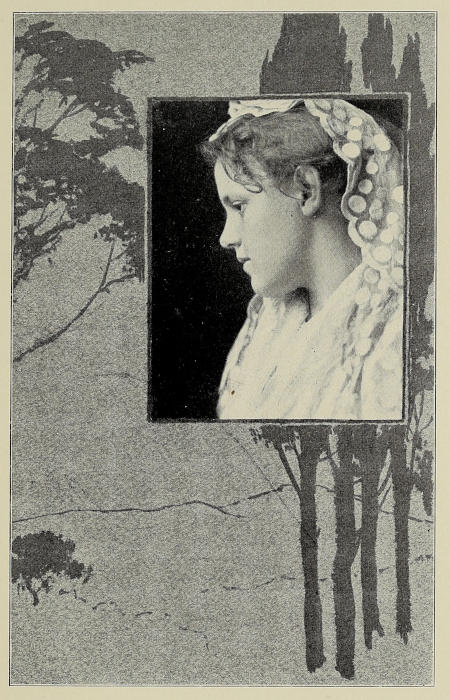
“Yet I can see that she might be in some respects a more comfortable girl to be married to than to be engaged to. Her past must make an informed betrothed much more uneasy than it ever can make her husband.”
“Well, I assure you that I am as bad as all the men—I like Alice. I have tried to manage other girls who annoyed me much more. There was Miss—we shall say Miss Huron, a Wisconsin girl, who was with us at Nantucket. Probably I am telling you too much. It is a tribute to your admirably feigned interest. Well, Miss Huron had the funniest habit of staying up late. She hated to see her company go home. You couldn’t frown or nudge her into letting them go when they wanted to. She was the most owlish of night birds. When it came to going in the barge to a dance (‘barge’ is Nantucket for bus or carryall) it was she who always kept the barge waiting at the dance. If she couldn’t be out late in any other way she seemed to be able to have accidents happen, and if she had to walk home over four miles of dark road after a carriage break-down she was as happy as a child, though the man might be worried and fagged. Yet she was the soul of prudence, and never got engaged to anybody.”
“Do you know,” I said, “a man takes a peculiar pleasure in hearing of such idiosyncrasies in women. These traits give individuality to them. Women are apt to seem too much alike. I am going to suggest to Jaxton that he write something in the[150] Darwinian spirit on ‘The Petty Depravities of Modern Women.’ It would be very instructive. You could be a great help to Jaxton.”
Miss Rittingway doubtless would have rebuked me had she not at that moment caught sight of Miss Pansy Marshford and Crewton crossing from the ball grounds toward the booths. “Poor Pansy!” she murmured.
“If you will forgive me for that momentary flippancy,” I said, “I should like to know why you are poor-ing Pansy. I thought every one was envying her.”
“Do you know Crewton?”
“Not well enough to refuse your opinion.”
“Probably you know that Crewton is very good. That is not the trouble,” she added with her enigmatical laughter of the eyes. “As he has lots of money it is a great credit to him to be so good. But Pansy wanted another man.”
“Did she hold off Crewton?”
“As long as she could.”
“Well, she at least has Crewton.”
“Is that optimism?” she asked.
“No; it is long division. What is the use of watching for miracles? Probably Pansy will be just as happy with Crewton as Alice will be with the last man she becomes engaged to.”
Miss Rittingway tweaked the handle of her parasol. “I have knocked about a good deal,” she said, catching my look at the “knocked about,” “but I hope I have retained that sense of moral[151] proportion which makes a woman like to see another woman get the right man.”
“Presently,” I said, “I shall decide that you are not a chaperon at all, but a matchmaker. I approve of your last sentiment—”
“You are so good!”
“—and I should like to be credited with the same notion. I like to see a man get the right woman. But it is a wearing thing to try to direct the course of sentimental lightning. My feeling would be that in order to be a successful chaperon,—that is, to please the guardian, the girl, the man, and yourself,—you should undertake to regulate the social rather than the moral proprieties. I should go on believing, unless you were to contradict me, that it is not so much the business of a chaperon to see whom a girl meets and marries as to see how she meets and marries. Yours is essentially the supervisorship of form.”
“If you will stop teasing,” said Miss Rittingway, “I may tell you about the experiment of Mrs. Rudderson. It is not apropos of anything you have said, which is, perhaps, a good reason for introducing it.”
“This is better than I deserve.”
“Mrs. Rudderson told me one day that she was going to try a social experiment. She was then a widow, thirty-six, good to look at, good natured, and comfortably off. To amuse herself she was going to bring a poor girl from a small town, fit her out, and give her a winter. The poor girl was attractive[152] and clever, and Mrs. Rudderson gave her the most worldly advice she knew how to give,—and Mrs. Rudderson knows the world pretty well. Before Christmas the experiment was moving along swimmingly. Mrs. Rudderson saw to it that her protégée met some of the most desirable men in the city, including Austin Crimwell, who had several times been reported as being committed to Mrs. Rudderson. Probably Mrs. Rudderson didn’t deserve what happened, for, if she had amused herself with the experiment, she took a benevolent pleasure in watching the success of the girl; but Crimwell fell plump in love with the protégée. Mrs. Rudderson should have known better. It is easy to say that now.”
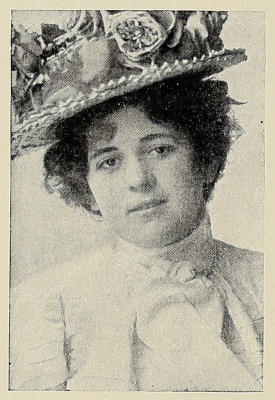
“I haven’t said it.”
“Somebody must say it if I have to say it myself. It was tempting Providence.”
“That is to say, Crimwell.”
“You understand,” pursued Miss Rittingway, without swerving, “she was a nice girl, and Mrs. Rudderson’s idea was to give her a great chance.”
“But not Crimwell.”
“You couldn’t say it was the ingratitude of the[153] girl. She didn’t know. It simply was the ingratitude of circumstances.”
When I suggested that Circumstances were old offenders, Miss Rittingway went on, looking past me: “I can imagine Mrs. Rudderson, when she saw Crimwell drifting, studying herself in the mirror. You know she was only thirty-six.”
“An ideal age.”
“Seriously,” demanded Miss Rittingway, “at what age do you consider a woman to be at her best?”
“At the age when she meets the man who falls in love with her.”
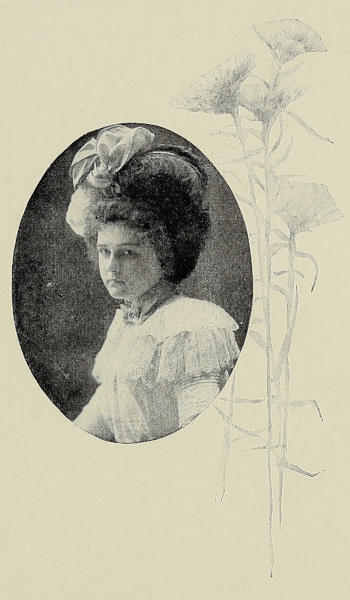
“Mrs. Rudderson is one of those women who always seem to find it easy to vindicate their age. But I shall ask you another question. You see, there was something about the girl’s family which the girl should have told to any one whom she was to marry, and when the engagement actually was fixed, Mrs. Rudderson[154] found that the girl had neither the courage nor the character to tell it. Mrs. Rudderson herself would have felt bound to tell it to any one but Crimwell. You can see how telling it to Crimwell would look. Even Crimwell must have known that Mrs. Rudderson was in love with him. What do you think Mrs. Rudderson should have done?”
“She should have told Crimwell.”
“She didn’t. She couldn’t. The thing which should have been told was nothing against the girl, and Mrs. Rudderson gave her a handsome wedding last June.”
“That is typical realism,” I said, “perhaps typical life; for there is no hero, no villain, a heroine who should have known better, and an ingénue without a conscience; and as for living happily ever after—”
“Oh, I believe the match will be a great success! And Mrs. Rudderson is to marry Senator Wrensel. I saw her at Newport and she was looking her best.”
“That is what I like about the modern woman. She is so beautifully adjustable. To be sure, it has been the office of women from the beginning to acquire adjustability, and every uncynical person has resented the demands which have been made on this quality. But the modern woman, in a greater degree than any of her predecessors, enjoys the graces of chance, knows how to turn defeat into victory. She can marry the wrong man[155] and never even let him know it. She can marry the right man and not upset him by making that too plain either. She can elude marriage altogether and make that seem not merely manifest destiny but a triumph of beneficent fate. She can be self-respectingly married and enchantingly single—”
Miss Rittingway checked me with a look.
“A man,” she said, “not only is greatly hampered in his view of these things, but he always appears to resent a woman’s ability to dominate social circumstances. It really distresses him to find that his initiation is not a finality, to discover that her last word is more potent than his first.”
“A cruel tirade,” I declared, “when I was only expressing my admiring astonishment or something of that import. As for her last word, even when you don’t say it—”
At this I saw the Judge coming back. “Judge,” I called down to him, “Miss Rittingway was just saying that she would like to have from you a judicial opinion on chaperons.”
“Well,” said the Judge, failing to observe Miss Rittingway’s protest, “there is a legal pleasantry which expresses itself in the query, ‘Who is to watch the trustee?’ I am going over there to arrange about the lunch for this interesting party, and then I am coming back to do some watching myself.”
“Don’t you think,” I asked Miss Rittingway[156] when the Judge had gone again, “that there is a touch of particular amiability in the Judge’s manner?”
“I think you had better go and help him about the luncheon,” was what Miss Rittingway said.
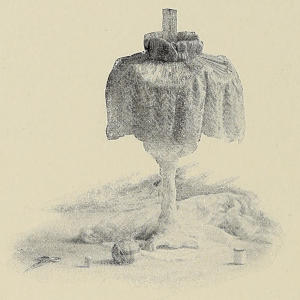
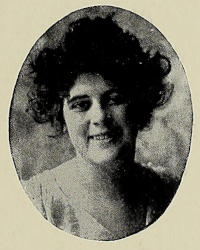
We sat in the “cave,” the smallest of Tranton’s rooms, and the one consecrated to his choicest company. Mere acquaintances were never asked into the “cave,” and even friends found that the place expressed certain moods in the owner. When Tranton said, “Let us go into the cave,” or shuffled mutely into the place in his barbarically embroidered slippers, and lighted the candles, the favored one understood. It was impossible to tell precisely why candles were used here rather than more modern agencies of illumination. When I once ventured to ask Tranton he simply said, “I like them.”
In the candle light the “cave” looked to be a cross between a condensed studio and a business[158] office. Rugs, skins, weapons, pipes, and trinkets littered the walls. There were other elements of conventional disorder. Over an oak desk in the corner were several photographs of women, an etching of Napoleon, a bow of yellow satin and a Turkish slipper filled with joss sticks. On the desk itself was a mess of literature and tobacco. Punctuating the triteness of the room were many little touches that were distinctively Trantonian, but which I spare publicity, lest they be repeated and thereby become trite in turn. Tranton himself personified something of the same conventionality relieved by difference. In the outer world he was so well dressed that no one ever spoke of his clothes, just as his place in society was so important and secure that no one ever called him a “society man.” He was old enough to have met a great many people; young enough still to have an open account with the affections.
As Tranton always took the chair by the desk, and as this when occupied blocked the path of retreat, he first sent me to the couch among the pillows. Then he drew over some pipes and a curious Egyptian jar containing his favorite weed. The pipe he chose for himself was of the sort you will see an Italian trench laborer biting, a black, hardened, surly-looking pipe which Tranton caressed with a tenderness that is lavished only upon inexplicable pets.
“When I left them,” said Tranton, resuming the talk we had begun in the other room, “they were[159] all quarreling over the question of Kipling’s treatment of women. It was a great circus. That Miss Fanchell said she didn’t think that Kipling could have known many good women—I think she said any good women—at the beginning, and that since he married an American girl, rather than modify his literary attitude, he preferred to write about men, beasts and locomotives. Mrs. Arch thought that he only used women as literary accessories, and Mrs. Gameston said she had heard that Kipling was very timid with women and that of course he couldn’t understand them very well. Little Miss Stillberry said it was quite inevitable that men should know more of forward women. They appealed to me before I got away, and I told them I could be of no help whatever, because I didn’t understand either women or Kipling, though I liked both. I ventured to say, however, that if the American girl Kipling had married didn’t make him like women, in my opinion there was no hope for him. That let me out.”
“I should think it ought to,” I said.
“Women,” went on Tranton, with his eyes critically directed toward the bowl of his pipe, “will forgive a man for not understanding them, but never for not wanting to. Every debate of that sort has this explanation.”
“Did you tell them that?”
“I didn’t have time to stay and tease them. Perhaps I didn’t think of it until I got away. That often happens, doesn’t it?”
“It is better to think of a good thing we might have said than of an awkward thing we wish we hadn’t. If they had been wise women, Tranton, they would have spent their time devising ways to get you to tell the truth about them. Admitting that you don’t understand women, your knowledge of them, your command of data, give you the means of being hugely entertaining.”
“Do you think so?” asked Tranton, still studying the pipe bowl. “I wish I could translate them as well as they can translate us.”
“You would do it with an unction, Tranton, and I am entirely certain that you never would be accused of lèse majesté.”
“Speaking of translating,” said Tranton, “a girl told me about a book the other day—outlined for me the Brother Henry chapter of ‘My Lady Nicotine,’ which somehow I never had read, but which I certainly shall read a good many times. I got the book, and I give you my word that, making allowance for the fact that she had the first try, the chapter, delicious as it is, is not so good as her translation was, hasn’t the flavor that her exquisite humor got into it. I could not help thinking how lucky Barrie would have been if there was some way in which he could have written that chapter after she had told him about it.”
“Hence,” I said, “the greatest luck that can befall a man is that he shall have a translator in the house.”
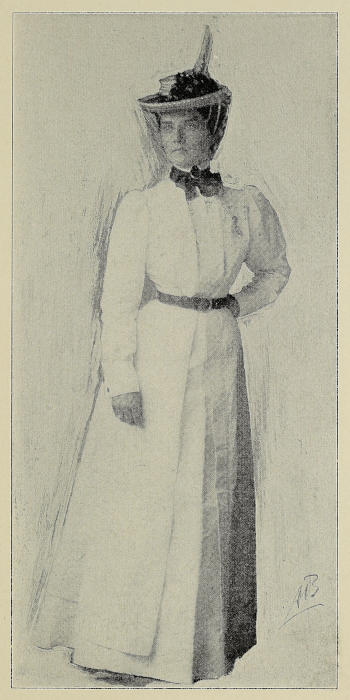
“Pshaw!” returned Tranton. “The translator would probably lose her zest if she were in the house. My translator was willing to be a translator. You married men—”
“Now hold on, Tranton. That is an abstract proposition. Don’t make it personal. Have you acquired that from—”
“Hold on, yourself!” retorted Tranton. “Your proposition is abstract enough, but—well, we are both open to suspicion, I suppose. A man and a woman who meet occasionally are one thing—I mean that they are two; whereas if the same were married—to each other—they would be quite another,—that is to say, one. When they are one they must lose the charm, the entertainment, the stimulus of being two.”
“Rot!” was my friendly comment on this. But Tranton went on:—
“Can’t you see,” he pursued, playfully knocking the pipe against the desk as if it were my head, “can’t you see the interest of intermittent associations in which all themes are relatively new and are never quite exhausted? What is it that makes marriage so stupid except to the accidentally right pair?—the certainty that the two who have become one will get talked out. It must be like talking to one’s self. In society it is different. You can’t get talked out. You can hardly get started, and a person must be a tremendous bore to give himself away with so small a chance. Thus you see it is very democratic and levelling. The brilliant don’t[164] have too much swing and the stupid are not crushed. There are men who are immense fun—once; girls who are witty and fascinating—the first time. Others have a long run,—for weeks, months, even years. But you can’t say how long a run they would have if you married them.”
“Tranton,” I said, “that is the way you talk to them. I know you. I simply won’t listen to your make-believe.”
“Oh, I am told that girls change a good deal during their married era,” went on Tranton, blowing the smoke at his bronze mandarin; “that would help keep it from being monotonous. Marriage itself is bound to change us when less revolutionary things are so potent. Take Grimsedge. Before he had his butler he was one man. After he had his butler he was quite another. He recognizes it himself. If he were writing his life I have no doubt but that he would divide the whole scheme into B. B.—Before Butler, and A. B.—After Butler. A woman’s married life, as I have been told repeatedly by women themselves, is full of change. Her constantly fluctuating estimate of her husband is one influence,—perhaps enough to account for everything. A friend of mine on the exchange told me the other night that his wife had gone through so many phases that when he reviewed his domestic career he felt as if he had been married to half a dozen different women. Now a man without a bigamous mind—”
“Tranton,” I interposed, “I have heard women[165] speak of you as a nice man;—what did they mean?”
“Ye gods!” murmured Tranton to the mandarin, “he asks me what a woman means!” Then he turned to me. “Let me give you another pipe. I have always been suspicious of that one. Once when I was smoking that pipe I wrote a drivelling letter to a girl in—take this one. It has a longer stem. The heat won’t be so near your brain centre. When you smoke that pipe cogent thoughts will come into your head. It is curious about smoking. You can pull a long stem in one place and you can’t in another. There is a great deal in locality. A very proper woman may smoke in Savannah, but a very proper woman may not smoke in Philadelphia. That is the way it goes.”
“Tranton, suppose I were a woman—”
“I can’t,” retorted Tranton promptly, “I haven’t that kind of an imagination. And it would be wrong in principle.”
“Suppose I were a woman,” I went on, “and had asked you how you justified yourself for being a nice man—”
“A woman wouldn’t ask any such fool thing. And what right have you to the secrets of the confessional? Here I am indicted for being a nice man on hearsay evidence. It isn’t fair.”
“Ah! my dear Tranton, you had better plead guilty and be done with it. We never could find an unbiased jury!”
“What is my sentence? Am I sentenced to[166] be confined in marriage with the girl for the rest of my natural life?”
“It would be a pity, Tranton, for you really are a sort of social father confessor. A great many girls would miss you if you were to marry. They have had you to practise on, to say their nicest things to, and you have never made them worry at the thought that you possibly could mean anything yourself.”
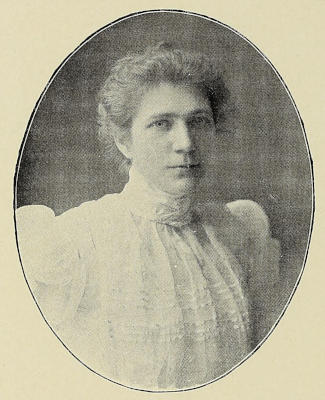
“Go on,” said Tranton staring down into the fuming abyss of his pipe.
“You have been so much nicer than the fellows who were in love, because you are always self-possessed and considerate and cheerful. Above all you have let them—the girls—be self-possessed and considerate and cheerful. They wouldn’t dare be so nice to the fellows they were in love with. Your easiness and effectiveness with them and their responsive easiness and effectiveness with you are a constant incitement to the men who are in the race for fair. You pace the lover.”
“Not so bad,” muttered Tranton to the mandarin.
“You are regarded as extremely useful. You are usher, best man, friend in need. You balance the table with the nice girl who is to be conservatively brought into the game. Single men tell you their hopes, married men their troubles. You can run a german or a chafing-dish. You always let a girl with a bad complexion have her back to the window, and when they ask you to make a light, you don’t set things flaring like a barroom. You flatter them by well-timed antagonisms. You never let it seem that you have permitted them to win, and you never beat them badly. You never flatter in words if there is a way of doing the thing by an action. You please the plain and tease the pretty. You ask nothing and you get everything—everything but the greatest thing of all.”
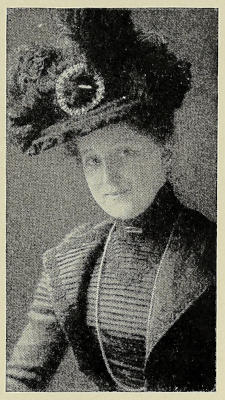
“You have left out some things,” said Tranton, smiling, “several important things.” He seemed to be going over these in his mind. “It is quite natural. You couldn’t know. We all have to persuade ourselves—unless we are a complaining bore—that life has great compensations for us. We have to stay satisfied. An optimist such as I am is like one of those story-telling liars who repeatedly[168] increase the figures, not merely to assure the astonishment of each new listener, but to keep up their own interest.”
“Are you an optimist?”
“Of course I am. Even on your own showing I have much to be thankful for. I may not have the greatest rewards, but I have many that are sweet if not great. If the best man sometimes sees the other fellow get the best woman, he also sees him take the great risks,—also sees him take the woman who is not best. If the stunning girls marry some one else, they expect a great deal from the some one else, and if they stop being stunning the burden of that is not too keenly on me. The new era finds them immensely discriminating, hard to please. They have a wide choice nowadays, and they exercise that choice with the austerity of a sovereign. Just now they are a little tired of dukes. They like football heroes better. And then there is always the trooper. He is in great demand. Then, too, the girls are getting very tall. It is hard to pair well with them. They are getting dreadfully clever, too, and that must make it intellectually difficult continuously to live up to them. The taste for violent contrasts seems to me degenerate. I hope the fashion will go out. I met Miss Wainscott the other day with little Carew. I tell you, they looked wrong. Then there is that little canary bird of a Miss Prune just engaged to big Kane. I joked her about him and she said she could say of him as Don Quixote said of[169] Morgante, that though of gigantic size he was most gentle in his manners. Of course, she will subdue Kane,—I told her she would make sugar Kane of him,—these little women are wonders. But that does not modify the spectacular absurdity of it.”
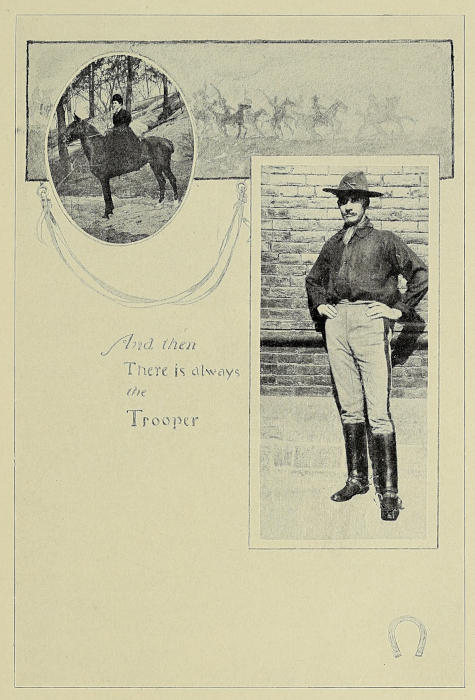
And then
There is always the Trooper
“It remains for you, Tranton, to set an example in this matter. You are a good example as far as you go. You have not been called a nice man without reason. But you pause before the ultimate example. You beg the question.”
“Probably the trouble is that I have a fatal veneration for women in general. I think of the individual only as epitomizing the sex. I understand that to be a fatal attitude of mind. Yet I find a corresponding attitude in many young women and women who are not young, and you have no idea how interesting that view makes them.”
“Oh, yes I have! That is the trouble. It makes them as interesting as it makes you.”
“Then what are you complaining about?”
“I am wondering what will become of you.”
“Become of me? There you are with your romantic, old-fashioned ideas again. Why should I become? I tell you, life reminds me of one of those boxes built to hold circulars or catalogues or free-distribution periodicals. They are marked on the outside ‘Take one?’ But there is nothing inside. Everything has been taken. We can’t all draw prizes,—we can’t all be prizes. ‘They also serve,’ you know.”
“You will be punished,” I said. “When Age has put you through the inquisition, and you have been broken on the wheel—of Time—you will take it all back, and will incur the aspersion of marrying to have some one who will put out your slippers.”
“You forget, that in that grand climacteric I shall have some very sweet memories.”
“It would be interesting to know what you will think of the American girl—then.”
“I can think only one way of her,” said Tranton firmly, and he put away his pipe as he might have taken off his hat. “She puzzles the foreigner, but she need not puzzle us after all. I was reading the other day a British officer’s estimate of our volunteers in Luzon. ‘They might be described,’ he says, ‘as a great military paradox—a body of men of magnificent physique, possessing perfect discipline, and yet without any discipline at all.’ It occurred to me that much the same thing might be said about the American girl. She doesn’t appear to have much discipline, but she has as much as her brothers, and evidently she has all she needs and the sort she needs.”
“If you had found her undisciplined, Tranton, you would have seen your duty.”
“I have no doubt that she has acquired a certain discipline from me—from her privilege of disciplining me. She will manage her husband better because she has been able to practise on me. She has given us new ideals. ‘She never suggests an inferiority[173] that makes her lovely.’ We can’t imagine her lovely that way. She is never a ‘sad ungathered rose.’ She isn’t gathered. Sometimes I wish she was a shade less practical; but I generally attribute this wish to the wrong pipe or a streak of ugly weather. She only reflects the spirit of the age. The other day, in a moment of curiosity, I ran into one of those highly moral restaurants that have Biblical texts on the walls, and there, under the gorgeously lettered beatitude, ‘Blessed are the pure in heart,’ was the brutal admonition in plain black and white, ‘Keep your eye on your hat.’ Under the sign, ‘Blessed is the matchmaker,’ a man should be able to read, ‘Keep your eye on your head.’ The world knows its business, and I suppose it is a better world than it ever was before. Yet it seems as if it must be getting harder to write poetry about it. What should you say to that?”
“I should say that if the world is better than it was, and that if it really is harder to write poetry about it, so much the worse for poetry. The joke isn’t on the world. I certainly do not think there is less real poetry in the world. Perhaps people live poetry more and write poetry less. Your American girls will have to look into this matter. The other day one of the magazinists discussed ‘The Passing of the Man Poet.’ Suppose this does happen, who is to celebrate the American girl as only verse can celebrate her? Are her praises only to be sung in a frowsy, pipish cave at eleven-thirty[174] by two doting, sentimental men? Here we are sliding into the night of the century. What a collection a century of her gowns and bonnets would make!—those high-waisted, clinging things, and the ‘pokes’ she wore in the morning of the century; the slope-shouldered, balloon-skirted affairs she put on at noon; the heaped enigmas she taunted the world with in the afternoon, and the modern décolleté paradox which little Tony Atwell explained in calling it a ‘coming out’ dress. We have become very plain and unpoetical, Tranton, but they are as picturesque as ever. They symbolize for us the eternal freshness, the unconquerable youth of nature. They preserve and transmit the primitive gayeties of art, the natural impulses of a younger world. The note of our raiment is blasé; hers gives token of an unjaded joy in the beautiful.”
“Sentiment,” said Tranton, “is like a cigar. You see only the smoke by daylight, the fire at night.”
“I don’t like that at all, for, by and by the cigar burns out.”
“Then you light another.”
“And if you do that too often you incur the smoker’s heart. Give heed to that, Tranton. Don’t tempt Providence. The day will come when your magic will wane of its power, when your ear will grow dull to the poetry of life, unless—”
“I never wrote poetry but once,” said Tranton,[175] in a voice that scarcely explained whether he was speaking to the mandarin or to me. “Perhaps that was because I never lived poetry but once.” Then he stopped as if he had said more than he should, and reaching for his pipe he began filling it again, deliberately. When he had finished this labor and had the smoke rising again, he reached down and drew out one of the drawers of the desk and lifted a little ebony box. This he placed on the desk, and opened casually with his left hand, pulling hard at the pipe and staring straight before him. From out the velvet recesses of the box came a miniature photograph framed in gold.
“I think I never showed you that,” said Tranton simply.
“You never did,” I answered.
I had seen the face if I had not seen the picture before. The picture called up the breathing loveliness of a young girl with frank American eyes, and lips that always seemed about to ask the question her eyes answered; a girl with wonderful hair, and above all, with a manner which the word “charm” seems but vaguely to suggest. Every one liked Celeste. It was a great shock when suddenly they took her away to Colorado.... I remember the wonderful glow of flowers when they carried her out of the church....
Tranton said not a word. It was plain enough....
We sat there silently for a moment. I held the miniature in my hand.
“Tranton,” I said, not knowing what else to say, “I guess the women understand you pretty well, after all.”
There was a moment of silence.
“I am very easy,” said Tranton, “—to them.”
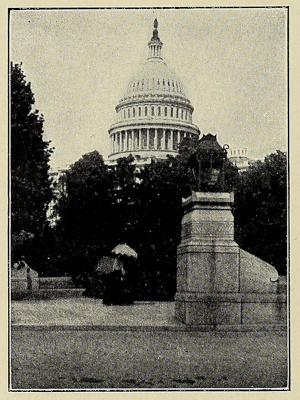
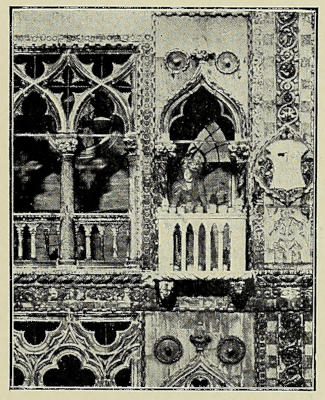
Miss Velrose and Rollington will be engaged within twenty-four hours.
In the sanctuary of love we find many who came to scoff and remain to pray; and Cupid in the sacristy, tugging at his vestments, is guilty of a purely voluntary and perhaps not wholly decorous drooping of one eyelid.
Miss Velrose and Rollington have come back from the boathouse. They are sitting on the stone bench under that maple.
Ah! Cupid has changed! Now he is reared in a kindergarten and is object-taught rather than book-taught. Arrows have gone out. Anyway,[178] they sometimes were geared with a white feather. Cupid is now using a repeater—and smokeless powder. You can’t locate him.
It is not so much that there is any difference in Rollington. The difference is in Miss Velrose. I have seen it coming on. They will be engaged to-day.
A man might propose and give no sign. There may be nothing absurd in the supposition that men ceased going on their knees when they abandoned knee-breeches and began wearing trousers, to which such an attitude is assumed to be an injustice. The theory has a chronological plausibility. But doubtless we shall find that there are other, if less pictorial, reasons for the change.
Hello! they have left the bench under the maple! Where did they go? It is a dangerously fine day. A proposal on such a day shouldn’t be binding.
Probably a general decadence in the habit of bending the knee has something to do with the disappearance of this feature of the proposal. Indeed, it is quite easy to see that the whole language of gesture is undergoing a change. Witness the present simplicity of the hat-removing gesture as compared with the highly circuitous symbolism of the seventeenth century; and there is quite as great a change between the bow of our day and that of the colonial era as between the kowtow of the Japanese, and the elegant salutation of the first Empire. Emerson complained of hand-shaking, though he was never stingy of his own friendly[179] grasp, and the most cordial of modern hand-shakes is a great modification. As Perry says, the girls now give you only one joint. All merely physical expressions of deference are perceptibly dwindling. There is no telling where these changes may stop. Kissing, long condemned both by science and by cynicism, survives variously and without apparent abatement. But we can not doubt that it is doomed. It may be the last of the inter-personal physical salutations to disappear; yet it must go. It is enough that we think, or at most look, our cordiality, and a woman, trained to these subtle readings, could not see a man physically kneel without laughing. In a telepathic millennium, not, perhaps, so far away, men will propose and be accepted without sign or sound, and the thought of photographic, or even of phonographic, record will be a meaningless joke.
O! there they are, crossing the tennis court in the direction of the arbor near the pine grove.
We learn from chemistry that not merely elements but sequences affect final quality. A sentimental situation may be tritely made up in this way: A woman; a man; a question; an answer. But how variously these may be put together!
Undoubtedly they are visible through the foliage of the arbor if any one chose to look. Let them alone.
It takes talent to reject a man gracefully; genius gracefully to accept him. Many a woman loses her last chance of supremacy, if she does not imperil[180] her equality, in the manner of her acceptance. I have heard a woman say that she never forgave her husband the artistic order and self-possession of his proposal. The brutality of such a thing lies in the fact that she cannot effectively do the same thing, though he might deserve it. Deny her surprise or confusion or some assumption of unpreparedness and you deny her a sophistry which sentiment seems by no means ready to give up.
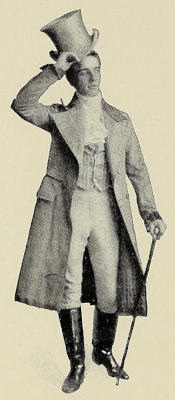
Of course they are still in the arbor. Who builds arbors? What do they build them for? Have those who build them prophetic souls?
Why, it was Miss Velrose herself who once spoke to me about unfair advantages. I can hear her very words: “And he took her away to sit out a dance,—yes, on a romantic balcony where the moon gave everything a theatrical color; where you could hear only the chirp of the piccolo, and the chuckle of the ’cello, and sang to her the song of songs. It wasn’t fair, of course. No girl could stand that. And a man who could live up to such a proposal would be a miracle.” “Be patient,” I urged, “there are new miracles.” “But they are not called men,” she said.
I know they are in the arbor, for there is Mrs. Velrose standing squarely in the middle of the coach road staring in that direction.

When I asked Miss Velrose the other day who was in love with her now, she looked at me quizzically and asked: “Do you mean, who is abusing me now?” I presume that is the only abuse Miss Velrose ever has had to suffer,—that of young men who have tried to scold her into being less obdurate. Women are not likely to reward abuse unless it is accompanied by tremendous persistency. In spite of time and change, persistency remains the greatest of all factors in courtship. Courting is like advertising—you must keep it up.
Mrs. Velrose has taken the butterfly net from the Winkinson midget and is chasing a papilio ajax—in the direction of the arbor. Mrs. Velrose is late.
It has been droll to see Mrs. Velrose guarding, with maternal persistency, her tall, white, sparkling daughter. No human partridge has ever more energetically fluttered to detract attention from the presence of her young. Mrs. Velrose is a prodigious talker. A mother who is a prodigious talker occupies a very important place in a girl’s fortunes.
Yes, Mrs. Velrose is too late. Rollington and his companion have emerged from the bower into the path[182] that skirts the pine grove. Probably they are going down to that wooded point by the lake shore. There is a rustic seat there.... Yes, that is where they are going.
Beyond doubt, the sweet inanities of courtship would be less sweet if not threatened with observation and interruption. The side glances of the world, the caution of parents, the inhibitions of society all play their parts.
Mrs. Velrose has abandoned the papilio ajax. She is coming back.
A daughter is a great responsibility. But so also is a mother. It is wrong to suppose that children feel no sense of responsibility for their progenitors. That larger education which so many women receive vicariously when their daughters go to college is one enforcing nice discrimination upon the educator as well as upon the educated. The American does not object to being governed. He only asks to select the machinery and the engineer. The American’s daughter expounds him. If every husband contrives to let his wife know how he likes to be managed, every daughter may find ways of making the yoke of her daughterhood exceeding light. In the debated matter of authority the American mother gives that she may receive. I don’t suppose there ever was a more perfect partnership, taken at its best, than the partnership of an American mother and her daughter, until marriage, which dissolves all other partnerships, brings its great readjustments....
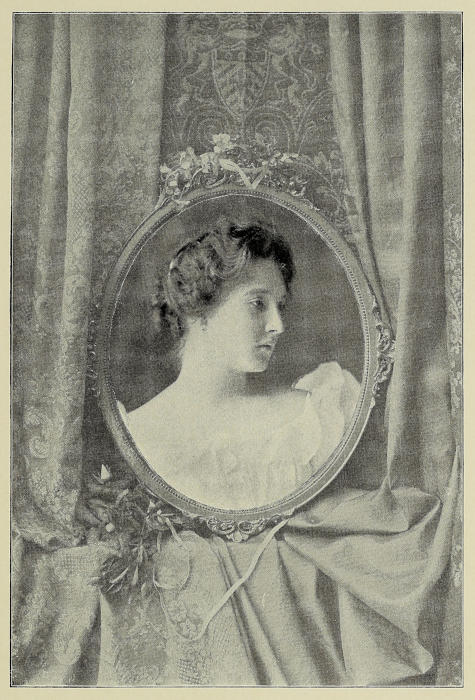
Miss Velrose’s voice ... behind my chair. I must have dozed off for a while there.... Yes, it is Miss Velrose.
“It was an interesting picture,” laughed Miss Velrose from beyond the back of another chair, “‘Philosophy Asleep.’”
“Philosophy has been caught napping before this—and by Woman.”
“I should think Philosophy might need a good deal of sleep.”
“It learns more when it is awake.” I looked straight across into Miss Velrose’s burning blue eyes. “Where is Rollington?”
Miss Velrose underwent a slight change of color. “A person who has just awakened often asks such curious questions,” she said.
“I was awake a little while ago—when you were walking on the path leading from the pine grove. I wish you would be seated. It has been dull here. And you must be tired after walking from the Point.”
“I sha’n’t sit down unless you can explain why you are so well acquainted with my movements. Were you tracking me?”
“Dear me, no! I had been sitting here reading the diary of a Puritan woman, Jonathan Edwards’ sister.”
“Prying into a woman’s diary.”
“That is what diaries are written for—to be pried into. What better luck could sister Esther ask than so reverent a reader. You must let me[186] read you a few scraps of it. We shall let Rollington go for the present.”
She gave me a queer look and seated herself in profile. Few girls have a profile like Miss Velrose’s. She would delight a cameo cutter. Her nose is just right, and noses are important in profiles.
“You may see,” I said, “that even these Puritan girls had their troubles. It is on the first of May that sister Esther writes: ‘The time draws near when I must determine which of the two gentlemen to proceed with.’ Which of the two gentlemen. Even in those days girls met with an embarrassment of riches. What strikes me is that they were very grateful. Her ‘considerable sense of spiritual things,’ in September, is followed by this declaration: ‘I was also in the evening stirred up to thankfulness by a new garment.’ Probably I never shall see your diary, Miss Velrose, but if I should it would be with no expectation of finding any thankfulness for the new garment. You modern girls take things dreadfully for granted.”
“I didn’t understand that you were to preach a sermon,” murmured Miss Velrose.
“You have labelled me Philosophy, and Philosophy must expound. Listen again: ‘Thanked the Lord for more than usual comeliness of countenance.’ Imagine your expressing thanks for gifts in that direction! You take them for granted, too. But here is an important point. I think I shall pigeonhole it for an essay on ‘The Antiquity of Feminine Skepticism.’ It was in 1739 that Miss[187] Edwards wrote: ‘Mr. Hopkins praised me and I began to think that I was a clever creature and was much elated, but rejected all as coming from Satan.’ No flattery for sister Esther! Ah, Hopkins! you were almost clever enough! She ‘began to think’! If you had been a little more adroit she might have believed altogether,—and what a comfort it might have been to her! Probably, Hopkins, you didn’t give sufficient attention to the little accessories. Maybe there was no romantic balcony handy,—or an arbor on the edge of a grove; perhaps not even a rustic seat on a wooded point overlooking a lovely violet lake.”
“The trouble is,” said Miss Velrose, “that men are so poor in invention. They are very dependent on accessories.”
“But their dependence on accessories, on a correct setting for the scene, is the result, first, of a becoming diffidence; second, of an evolved delicacy. Let us suppose, for a moment, that a fellow is proposing to a girl.”
“How droll!” said Miss Velrose, still keeping her profile in position.
“In other words, fancy the most delicate situation in the processes of civilization. He has a certain thing to ask; she has a certain thing to answer. When it has gone so far, it is not so much what he asks as how he asks it. It is like lighting a Welsbach lamp. Sometimes it blazes up in a yellow, smoky flame. Then you have to turn it out and start again. You never can tell why the flame acts[188] so. The flame has its own reasons for coquetting with the match.”
Miss Velrose gave a little snort.
“Of course the girl has the advantage. That is as it should be. It is like one of those suits in court where the defendant has the affirmative. She knows what he is going to ask. He doesn’t know what she is going to answer—then. She doesn’t know how many times he can be made to ask—whether there is more than one ask in him. There is a presumptive limit to his persistency and to her discrimination. If a girl is far enough gone, time, place and manner are of no importance. If she doesn’t like him quite so well, she might waive time and place, perhaps. There are infinite variations.”
“I was afraid you were going through them all,” said Miss Velrose.
“But above everything,” I pursued in defiance of Miss Velrose’s irony, “he must be definite. I once heard a girl say, ‘I believe I was proposed to last night, but I am not sure.’ Some men weakly dread to ask the old question in the old way. They introduce dangerous artistic variations.”
“Generally,” declared Miss Velrose, “it isn’t art; it is caution. They wish to be dead sure before they are quite definite. They are like governments who throw out a hint of a proposed movement to see how much and how many of the newspapers will howl.”
“You think he should plunge in with a gambler’s[189] defiance. You justify the gambling instinct when woman is the stakes.”
“It is cowardly to want to be sure.”
“It is worse than cowardly, for a man never can be sure. Yet a proposal is a big investment to a sensitive man. He can’t afford as many proposals as she can.”
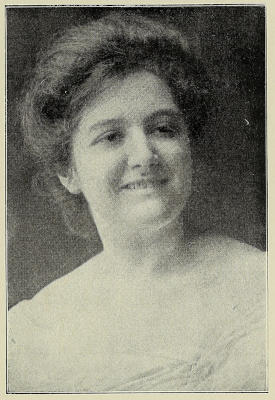
“How could you like him unless he dared to lose all? If he is sure, the greater part of the compliment is absent. The greater the odds against him, the more it will hurt him to lose, the finer the honor he pays her.”
“Yet because he wants to win he must attend to every point. I only wish to defend him against your accessories imputation. There are kinds of courage you wouldn’t wish him to have. He may look an enemy in the eye, but he must not face the woman to whom he proposes if he wishes her to believe that he has a spark of sensibility. I once heard a man say that when he proposed he sat opposite a mirror. The brute!”
Miss Velrose’s cameo relaxed, and dissolved into a three-quarter view as her burning blue eyes turned toward me.
“Don’t!” I cried. “Don’t look at me that way, or I shall have to stop expounding! You prove that what I say is doubly true. Suppose she looked at him that way when he was in the middle of it?”
“Suppose that was part of her test?”
“Impossible! Not in that crisis. The presumption is that she has inflicted that at an earlier stage. To be sure, if she wants to pile on the agony there is no one to prevent her. Be honest—shouldn’t you be afraid to live with a man who could look you in the eye when he proposed? Should you expect him to anticipate composedly living with a girl who could look him in the eye when she answered him?”
Miss Velrose laughed softly. “What do you suppose Lady Mary Montagu meant when she said that women see men with their ears? Didn’t she mean that they listen too much? Didn’t she mean that we should go into matrimony with our eyes open?”
“I have not the presumption to analyze the cynicism of Lady Mary. She said some rather mean things about men. But let that go. You never could even imitate her. It isn’t at all in your line. I am sure of that or I shouldn’t tease you.”
“Are you teasing me?” she asked, lifting her brows and lowering her lashes.
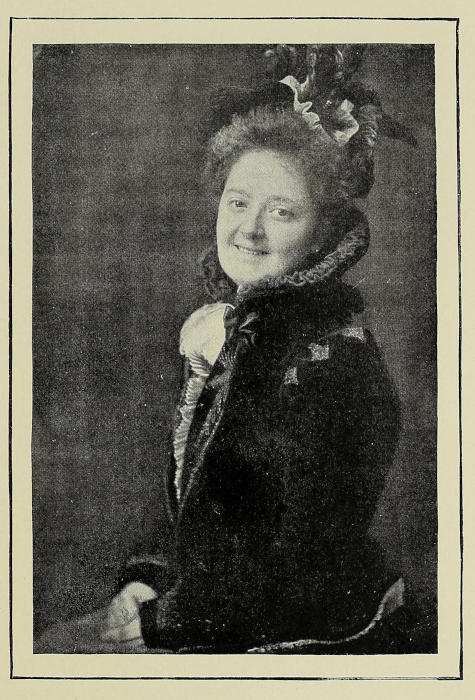
“Does that mean that no one ever has dared to tease you, and that you don’t even know the signs? When Rollington teases you, is it very different?”
“Rollington never teased me.”
“‘Never teased me.’ Teased—past tense. Then I am right.”
Miss Velrose’s eyes were not as steady as she could have wished. She is a good tease herself. I owed her a few grudges. “Right about what?” she asked with a charming effect of indifference.
“Right about that rustic bench. Forgive me. A man so seldom is right that you can’t expect him to be wholly composed when he blunders into anything.”
“It is nice to see you so easily pleased. But just as a matter of reasonableness,” added Miss Velrose, “a past tense might have two meanings.”
“True,” I admitted. “It might. I admit that. But when one alternative is supported by unmistakable signs why consider the other? Look at Rollington.”
She bit her lip, and did not turn her head. Rollington was sauntering up the path from the boathouse. He was endeavoring to look ennuyé.
“He is trying to look calm,” I said, “but it is a case of radiant repression. Rollington is a fine fellow. Sometimes the right thing happens. I am going to be more of an optimist than ever—even though you may never speak to me again.”
“There are several things,” said Miss Velrose[194] very steadily, but with a little amused flutter of the lips, “which some one should say to you.”
“Oh, some one has!” I answered, getting up. “Don’t feel that you have to discipline me merely from a sense of duty.”
“I abandon you to your own conscience.”
“What cruelty!—you knowing that it is a Scotch conscience!”
“Your sophistry will help you out,” said Miss Velrose, in a voice as if she knew that Rollington was very near.
“I have at least one virtue,” I said. “I can keep a secret.”
A proposition which is perfectly apparent.
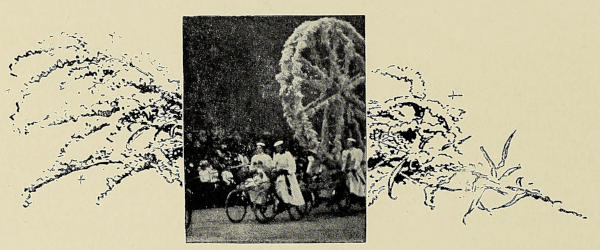
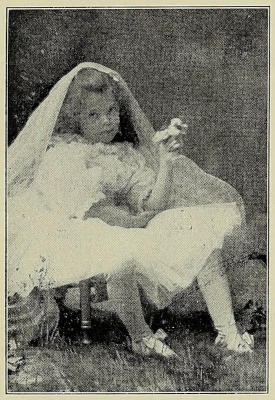
They were playing the ballet music from “Sylvia” in the loggia, a levity which no one resented, not even the old gentleman with the pale daughter, and the unctuous wheeze of the clarionette floated through the palms of the court where the fountain was flinging diamonds into the sunlight of a Southern February. The Spanish banners flapped lazily at the gate. No one resented them either, for it was a good six months since we had been at war with Spain. Moreover, St. Augustine never had been at war with Spain. It wouldn’t have been right.
The old gentleman was reading a St. Louis newspaper. The pale daughter was looking out through the arch toward the Alcazar. Near at hand were[196] two youngish women with books in their laps. I could hear one saying to the other: “You see Virgil stole from Homer, and Dante was Virgil’s pupil. Dante gave credit to Virgil, but Virgil didn’t give credit to anybody.” Evidently this fellow Virgil was a rascal.
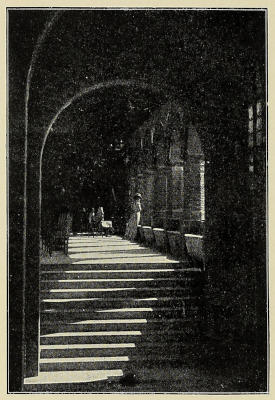
The Druggles party had returned from the links, and the general had a story about a tremendous drive of his that carried his ball among the prisoners at San Marco, and his little brush, afterward, with the guard at the gate. Mrs. Willie Roysell of Boston was complaining at the news that if you went to any of the hotels further South you would have to sleep on the steps.
I had just parted from Mrs. Roysell when I saw Madge Emmerton pass under the portcullis. I knew her despite the veil and the shadow of her broad hat. With one hand she held the loose of her white piqué. In the other she was managing a purse and some small packages that suggested the bazars down the street.
When we each had said how surprised we were, and had taken chairs in the shade, she looked at me suddenly and said, “I don’t believe you know.”
“Know what?” I bluntly returned, looking into her radiant face.
“Of course you don’t. You never could do it so well. And you would have had the grace to ask after him.”
“Well,” I said, “I haven’t had time to ask after anybody yet. Please explain, so that I can ask intelligently. Are you married or anything of that sort?”
She nodded frankly.
It all came back to me then. Two of the handsomest young men in Philadelphia were in a state of intense willingness when I last saw her. But she was not one of whom it ever was possible to guess whom or when she would marry. And I never had heard a word of the engagement. There was a great disparity in the financial resources of the two men, and, as it had seemed from informed comment, some disparity also in their intellectual resources. It is only fair to Providence to say that it had generously given the great talents to the man without money.
“Which one did you marry?” I asked. “The poor one or the rich one?”
“The rich one,” she replied with an entirely unembarrassed laugh.
“So that the poor one is now doubly poor, and the rich one doubly rich.”
“No,” she said, “that wouldn’t be fair. I shall make the rich one a little poorer and leave the poor one to be richer.”
“Oh, I dare say it is pure altruism. But where is he? The new idea of marriage may imply strictly preserved personalities, but I always have fancied that husband and wife were quite indivisible on their bridal tour at least.”
“How absurd! As if it wouldn’t be more dangerous to have him tire of me now than at any later time. I send him away every afternoon somewhere.”
“Poor fellow!”
“And I have been off buying St. Augustine souvenirs made in Philadelphia. Then I had a lot of little commissions. I promised my brother Cliff to send him a live alligator. I have just been buying it in that funny St. George’s Street.”
“I didn’t notice it as you came in. Have you hitched him at the gate?”
“Oh, no! he’s only a baby and goes by mail.”
I glanced at her purse. “‘In her left hand riches.’”
“Which is to say, ninety cents. Think of you quoting Scripture!”
“You should be glad I didn’t say ‘Yielding pacifieth great offences.’”
“I have more than a suspicion that you are thinking things you won’t say.”
“Which would be futile, for you would know what I was thinking.”
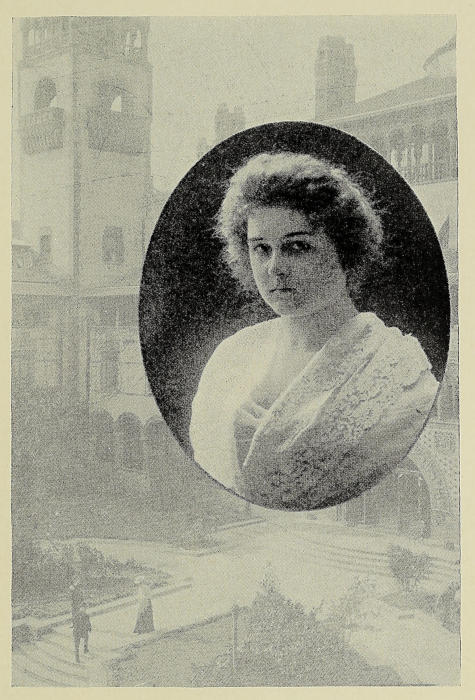
“What were you thinking?”
“Perhaps of an inappropriate topic—marriage.”
“How interesting! Tell me about it!”
“It would be more sensible of me to go and find your husband and tell him he may come back, that you are dying to see him, and that you have spent all but ninety cents.”
“Do you really think I am mean to send him away? Isn’t that a good idea of mine?”
“It is an excellent theory. I like it. But I hate to see either of you able to carry it out.”
“He isn’t able. He isn’t carrying it out. He is only doing what he is told.”
“You have begun well.”
“It is great fun—he never will obey so implicitly again.”
“I doubt that. The habit of obedience once formed is tenacious in husbands as in others.”
“I hope not. I should hate to have him stay so obedient. Don’t you think it nice of him to recognize my claims that on a bridal tour the bride must have her own way?”
“Yes,” I admitted. “I do, and not the less nice of him because letting you have your own way is so dangerous.”
“He seems to be utterly insensible to danger. It is charming.”
“It is interesting to find that you have begun to understand him already. Dr. Johnson once said that few people who have lived with a man know what is remarkable about him. Probably he was[202] right. Mrs. Johnson is known to have said that her husband was the most remarkable man she ever met, but there is no evidence that she knew what was remarkable about him.”
“There is nothing remarkable about Bert. It is one of his charms. I remember once that when mother was telling me I should acquire certain practical accomplishments upon which I might fall back in case of accident, I said that none of the professions attracted me, and that I preferred to be ‘just a plain lady.’ Well, Bert is just a plain gentleman. Are you laughing to hear me praise him?”
“I was not laughing. I was wondering whether you said such nice things to him—whether you thought it would be good for discipline.”
“Of course I say those things to him. When a woman marries a man she pays him the biggest compliment one human creature can pay another. Nothing that she can say after that can seem excessive, can it?”
“And yet, it will make quite a difference to him, I fancy, whether you do say those things or not. He paid you a compliment when he asked you to marry him, as large a one as he could possibly. Yet you will like to have him say things once in a while.”
She gave a little unreadable laugh. “Somehow I don’t expect to spoil Bert. Because he is just a plain gentleman, and not a genius or anything like that, I am not so nervous about him.”
“He ought to be very grateful. I have no doubt but that he is grateful. Do you know, I think you are quite as practical as if you were fashionably flippant and cynical? We always are drawing on our imaginations or our bank account. Undoubtedly we should be careful to avoid an overdraft. Marriage is a sort of promissory note.”
“That sometimes goes to protest?”
“That sometimes go to protest. It is a kind of duet, too, a duet in which it is not so important that the quality of the voices shall be the same as that they shall agree, first, to sing the same tune, and second, to sing it in the same key.”
“Yes,” she said, “I can see that the key is very important, even if he had to hum or whistle. Which reminds me that Bert can scarcely tell one tune from another. It was General Grant, wasn’t it, who only recognized two tunes?—one was ‘Yankee Doodle’ and the other wasn’t. But Bert likes music—my music.”
“I believe you—I believe him. And that will always be a great help when it comes to managing him.”
“Yes, Bert will need considerable managing,—what you might call minor managing. I don’t pretend that he is free from that necessity.”
“He will just need managing enough to keep you pleasantly occupied. It is not good for man[204] to be unmanaged. Let none that wait on thee be ashamed.”
“Are you quite sure you are not agreeing with me about everything just to be nice?”
“Quite sure. Though it is true that no one should or could quarrel with a bride.”
“Except the bridegroom. You would be surprised to know how many bridal-tour quarrels I have heard of.”
“Who tells?”
“The participants—long afterward; and not always so long afterward either. I have a friend who told me when she came home from her tour. And guess what it was about?”
“I couldn’t.”
“Whether he or she should pay for some caramels. So you see there are bridal quarrels, and they are confessed.”
“It is a pity.”
“The quarrels or the telling?”
“Both. But I suppose people who are low enough to quarrel would be low enough to tell.”
“It doesn’t seem likely that I shall quarrel with Bert. You see we are such good friends.”
“That should make a difference. Perhaps that isn’t a common situation. To be sure, you American girls are credited with inventing that idea—the idea of marrying a friend.”
“Whom should we marry—our enemies? We are told to love them, but not to marry them.”
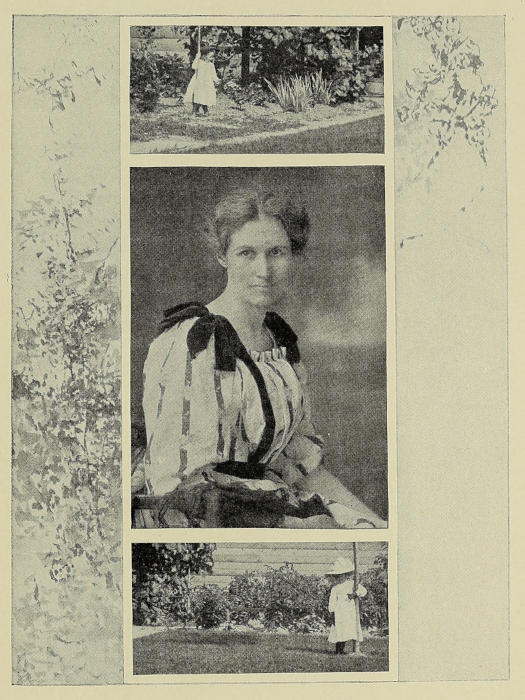
“They once seemed to divide society for a woman into friends, enemies, and husbands. The husband was—just a husband. When a husband has been a friend—”
“I see. You make marriage a sort of post-graduate course in friendship. I must tell Bert that I shall have something to add to his M. A.”
“Yes,” I said, “Master of Hearts.”
“I should like that better if it were not plural. It sounds too promiscuous. Bert isn’t at all promiscuous.”
“Let me see—Magister amoris: that is scarcely definite enough either. But Bert has acquired something more important than a degree—he has acquired a detached and supplemental conscience to which he may look for a candor even greater than that of his own.”
“I am to be a conscience to him, am I?” she asked.
“But a proper and effective conscience, a conscience that acquires a controlling power, has, I need not tell you, a still, small voice. In this, minor managing of yours, in the process of which you will act as Bert’s detached conscience, you must be very dexterous. It has been said that the secret of being a bore is to tell everything. It is the same way with consciences. A conscience that told everything, that didn’t know when to be inaudible, would get to be—ineffective. All of which it is quite unnecessary to say to you.”
“O, I don’t know!” laughed the bride. “I enjoy being warned a little. It makes it all seem excitingly difficult.”
“You mean being warned a little more, for you must have been warned a great deal already.”
“Yes. All of one’s friends help a little. Marriage is like a country surprise party each guest of which has been asked to ‘Please furnish Advice.’ Aunt Levina said: ‘My dear, marriage is like medicine—it isn’t so much what you take as what you believe it is going to do.’ Papa said: ‘Madge, girl, ask your mother how she hypnotized me. That is the most painless way it can possibly be done.’ Mother said simply: ‘Always be his sweetheart;’ which amounts to about the same, I suppose, as Mrs. Kansett’s counsel: ‘Make all other women seem less interesting to him than yourself.’ Major Carringward said: ‘Boss him, Madge; boss him. But never boss him when he is bossing you.’ You see it was all nice and easy. I shouldn’t have any trouble at all.”
“I was wondering,” I said, “while you were enumerating these items of advice, what sort of directions they gave to Bert—I mean beyond ‘Be good to her, my boy.’ If they give a man less advice, perhaps it is because there is less latitude for advice to him. ‘Be good to her’ is a comprehensive gospel for him. Then it may be that she gets more advice because the situation really is more in her hands. Anyway, it begins to look as if the world had begun to insist that he shall be[209] good to her. Even the world’s advice to her is advice looking to that end. That all the world loves a lover means nothing more than that. The lover who stops loving has lost the world’s love as well as everything else.”
“I must tell you,” said the bride, “what brother Cliff said not long ago. He had been sitting at the window studying Life a long time, when he looked up and said: ‘Mama, aren’t there any happy married people?’ We all laughed. Probably that didn’t make the matter any clearer to Cliff.”
“We shouldn’t draw too severe an inference from satire. Perhaps satire is like news—it exploits the variations, the unusual. It takes happy marriages for granted, which is what nature does about everything that goes rightly. That’s what my friend the editor tells me. ‘Why!’ he says, ‘the biggest compliment we can pay virtue is to advertise vice. Can’t you see that we stamp vice as exceptional when we class scandals with accidents?’ Yet it is too bad that we have to hear so much more about the failures than the successes. It is likely to have an effect upon us at times such as you observed in your young brother. Marriage is not only what they that marry make it. It is also what the onlookers make it. To paraphrase Dr. Johnson’s saying about books, marriage should help us either to enjoy life or to endure it, and if it is to go on filling that great office it is quite important that you American girls, who are credited with introducing[210] so many modifications, should keep this in mind.”
“I don’t know that I should feel quite comfortable,” said the bride, “if I thought that so much really was left to me. It would be a great responsibility—greater, I think, than I should care to take up. You and the rest must forgive me if I forget all the advice.”
“That is just what we all should hope that you will do. A woman’s reason is the best of all reasons—especially for friendship and love. A friendship that could be explained would be stamped with inferiority. We love our friend—because. We marry whom we marry—because, and we may thank Providence that it is so.”
“Yes,” she said, looking very earnestly at me, “when it is ‘because,’ it is more likely to last, I think.”
Then a sudden change came into her face, the loveliest change that ever can come into a girl’s face. I knew that he was walking up the path.
“There’s Bert! And I don’t think I have told you yet—definitely,” she said, leaning forward and speaking with her eyes toward the path, “that I liked him much better than the other from the very beginning. I only waited long enough to be quite sure that that was true.”
There was something he wanted to show her in one of the bazars, something he wanted to get for her if she liked it, and presently they went down[211] the path, under the palms, and out under the portcullis, the bride and the groom laughing together....
And the fountain is still flinging diamonds into the sunlight. The shadows are a little longer. I wonder if the band has played its last piece? I wonder if my bride isn’t really through with all those letters over there in the writing room? I just found myself staring across the court, past the palms, and the fountain, and the loggia. I fancied the bride of long ago coming under the portcullis on her palfrey, a shining knight by her side. I saw the bride of peasant Europe, wreathed and radiant, her strong hand on her husband’s arm. I saw the Puritan bride on John Alden’s “snow white bull” riding happily home. I saw the bride of the young Republic laughing from under her bonnet into the smooth face of her Revolutionary soldier. I saw the bride of the South at the door of the family coach, the proud old black driver in his seat, the air full of sweet odors and merry cries. I saw the bride of the West riding her mustang over fresh trails to the miner’s cabin, or over the silent prairie to the ranch of hope. I saw the bride of the farm go away to the noise and smoke of the city. I saw the bride of the city follow her hero unquestioningly into bleak and lonesome solitudes. I saw the bride who had won the honors of the world put aside trophies and prizes for the simple joy of creating a home....
Ah! here are the bride and the groom coming back! I knew their silhouette in a moment under the arch. And how fortunate—it was not the last piece! The band is playing again! I wonder if they are too absorbed to notice that it is playing the most important part of “Lohengrin”?
